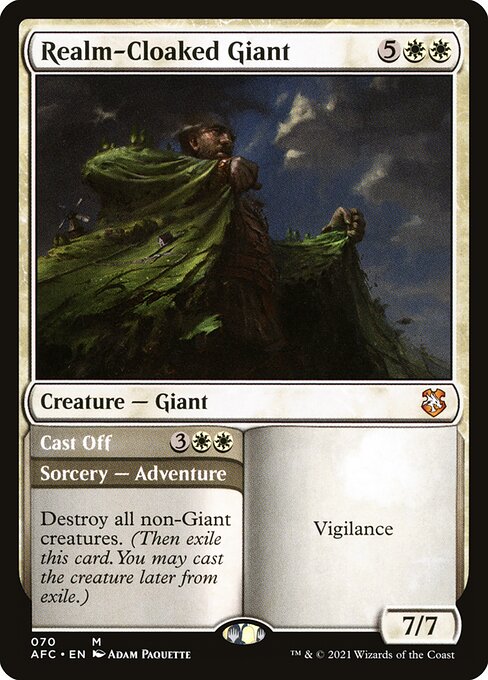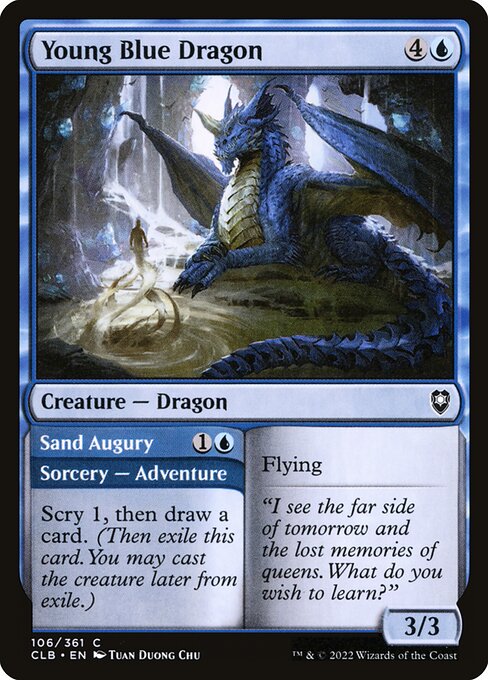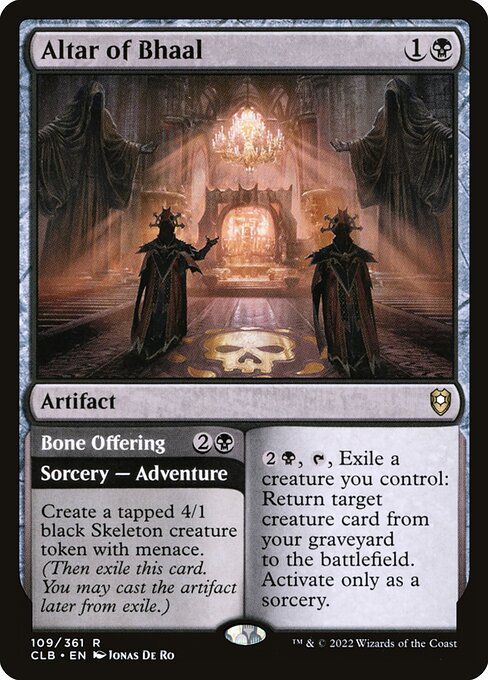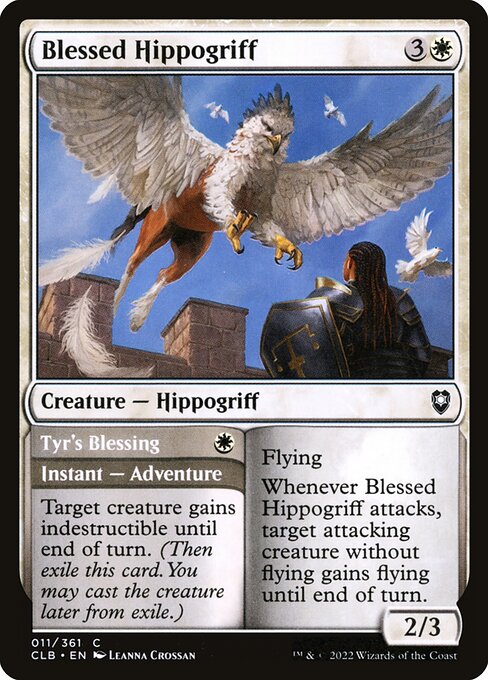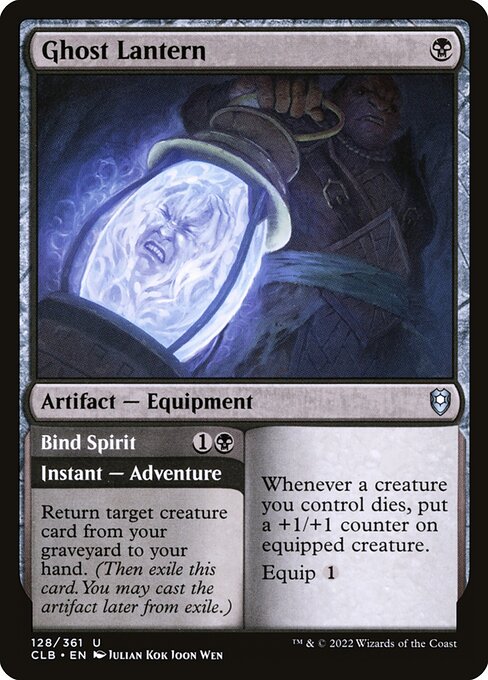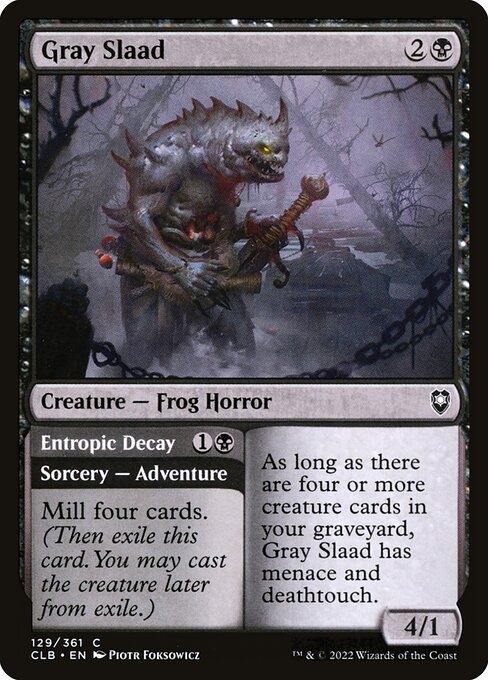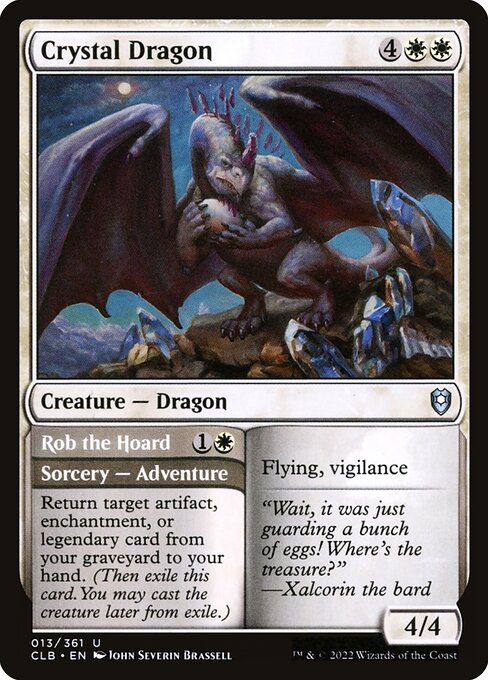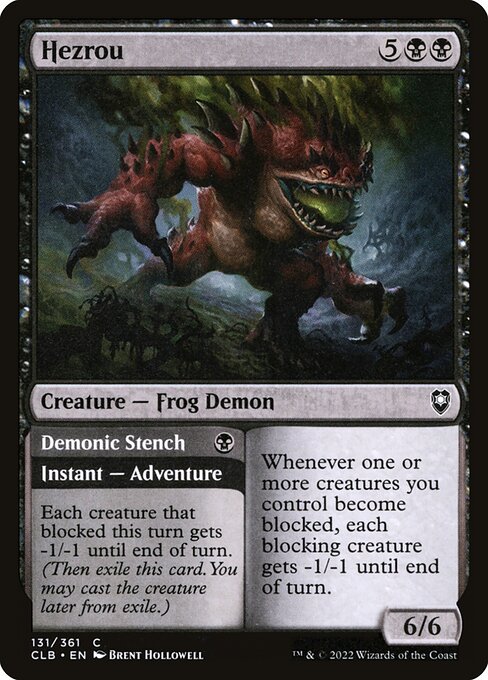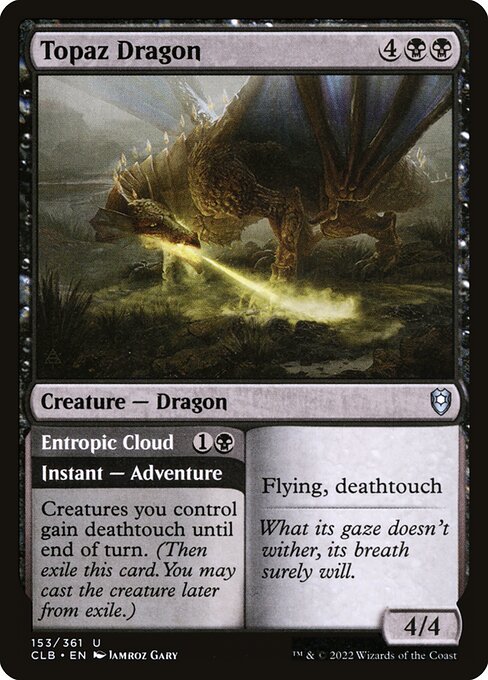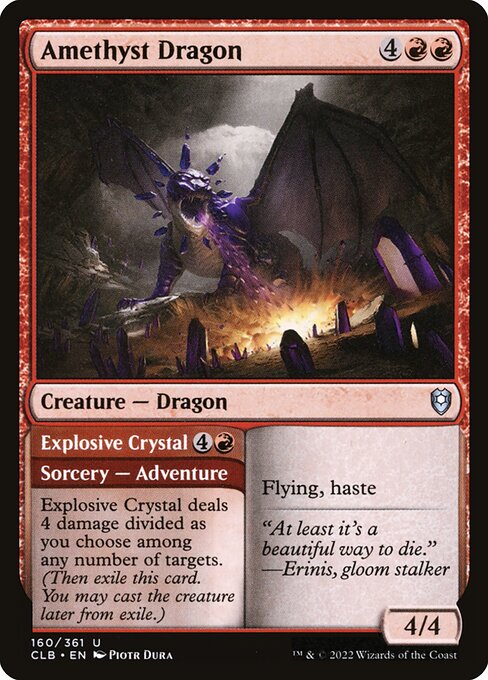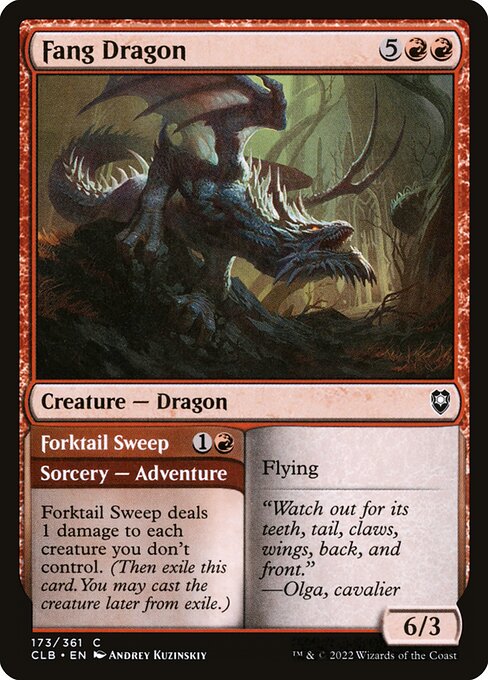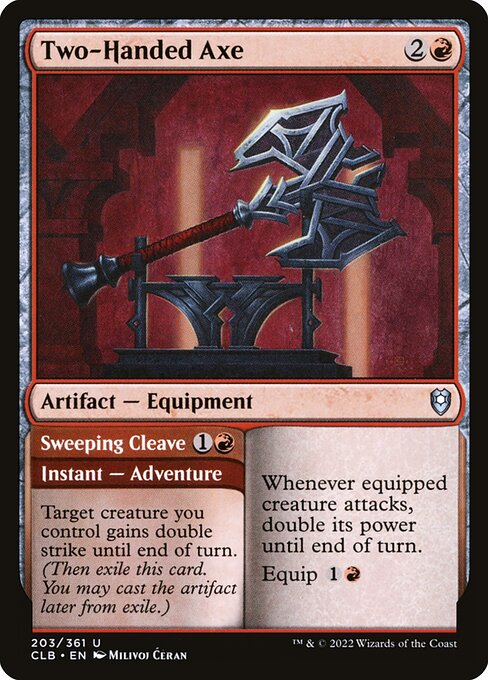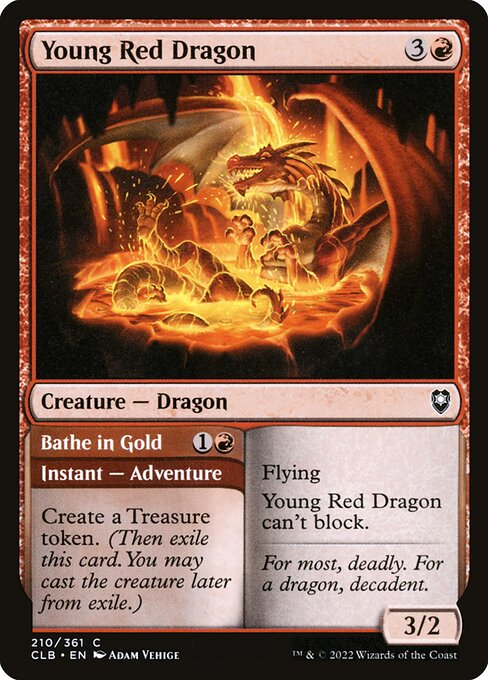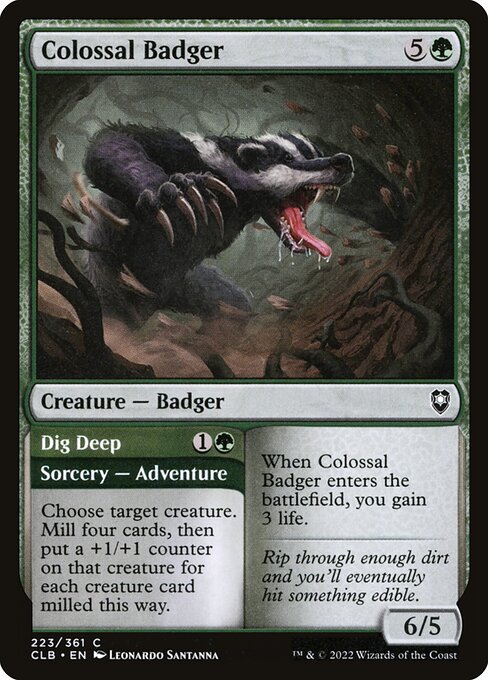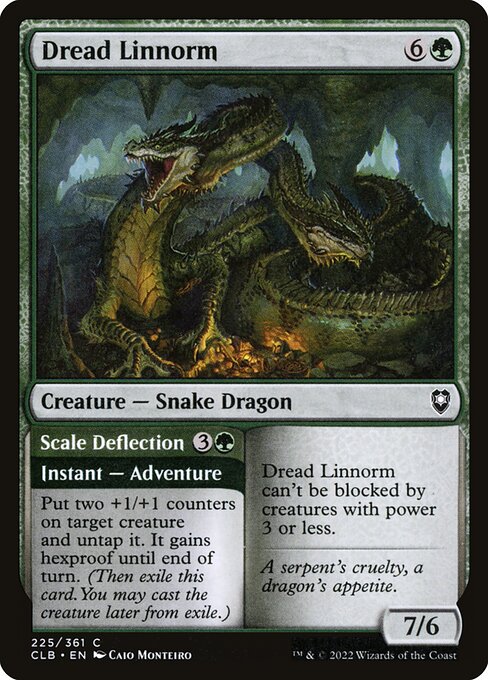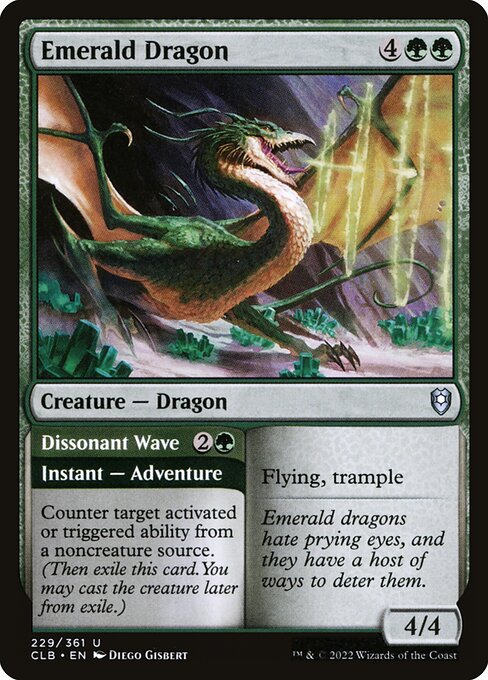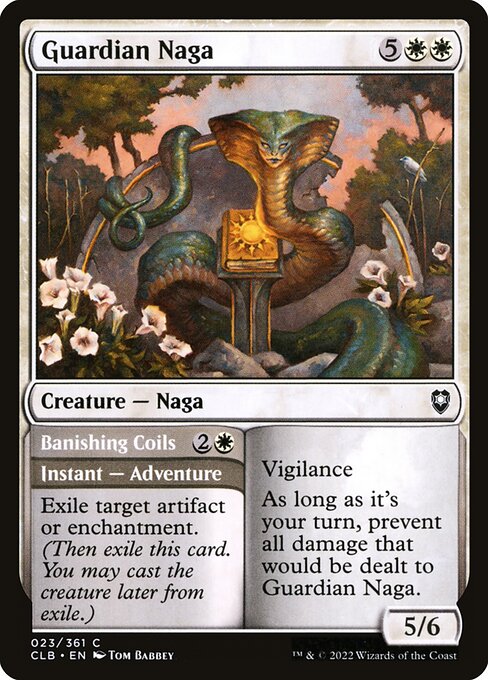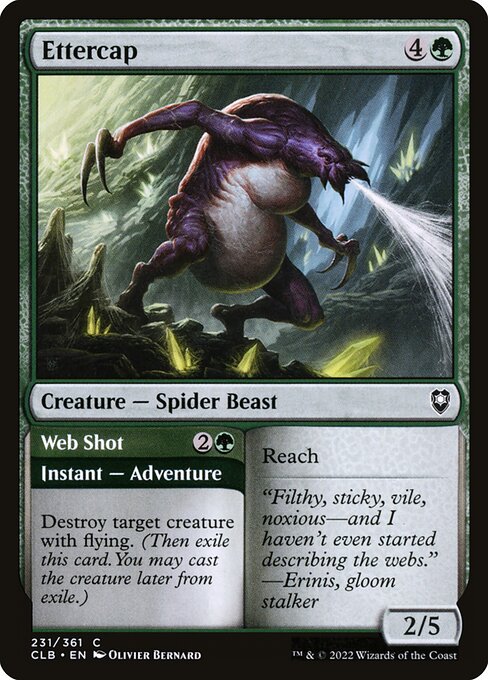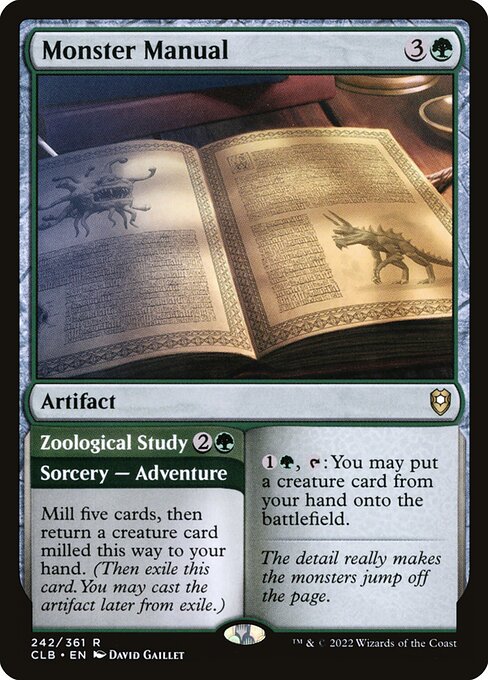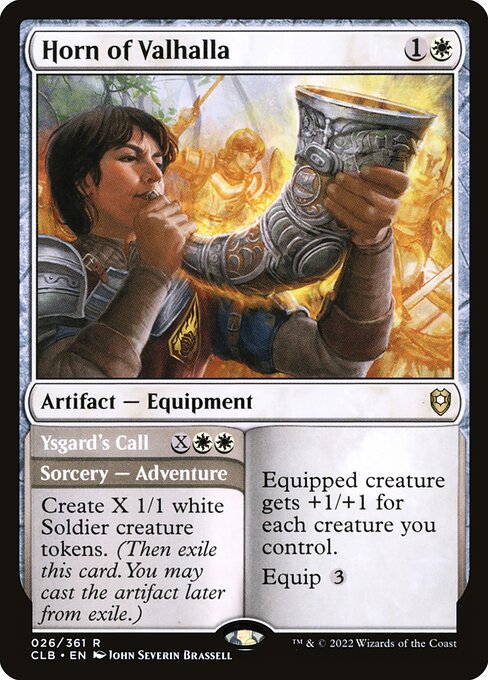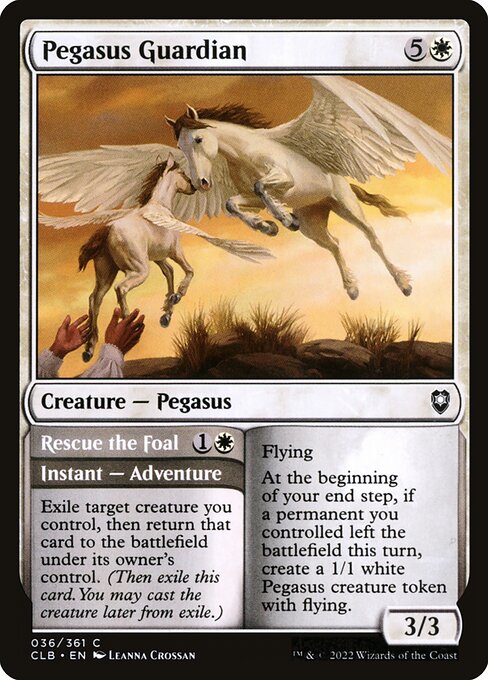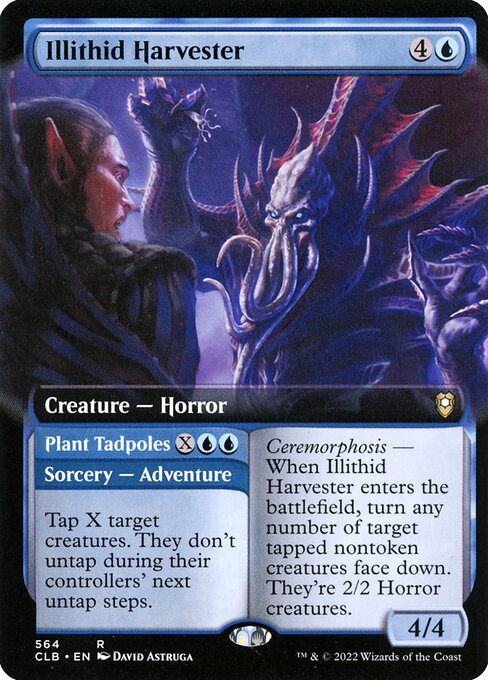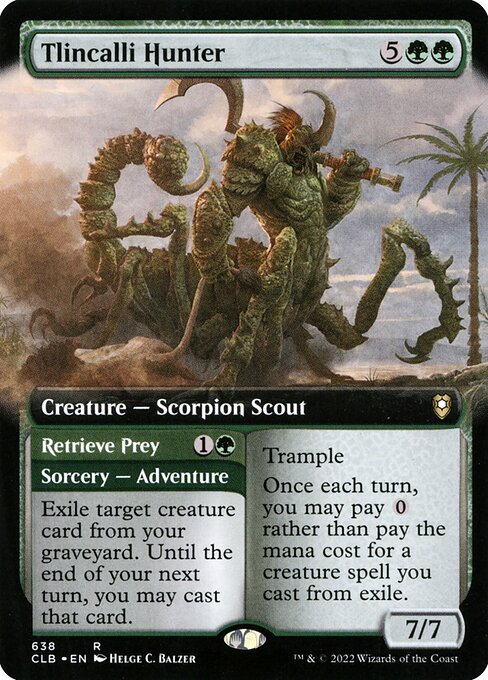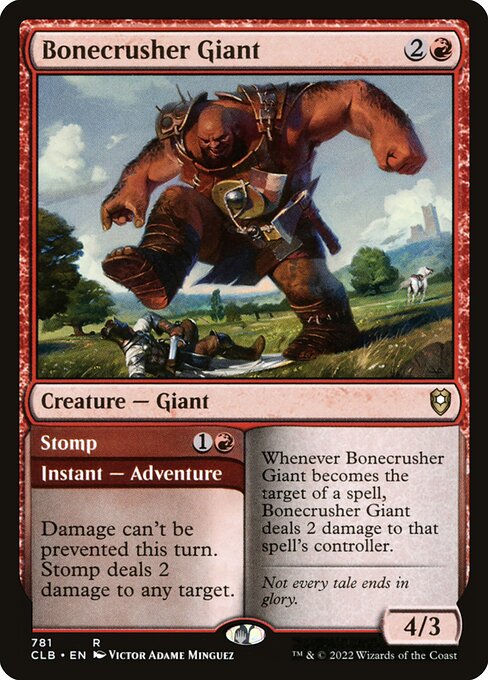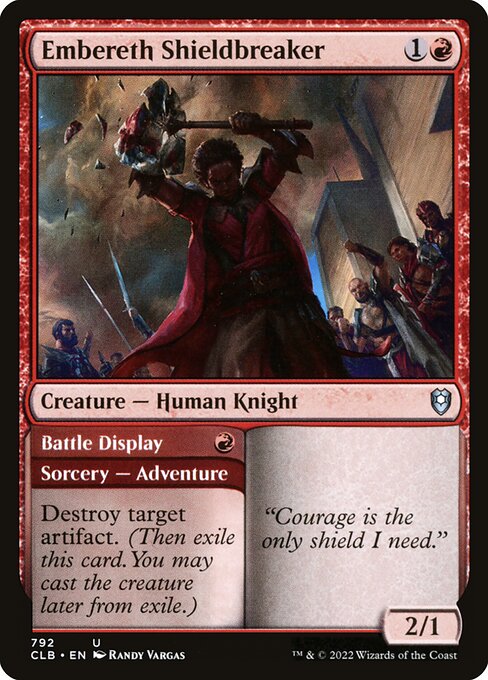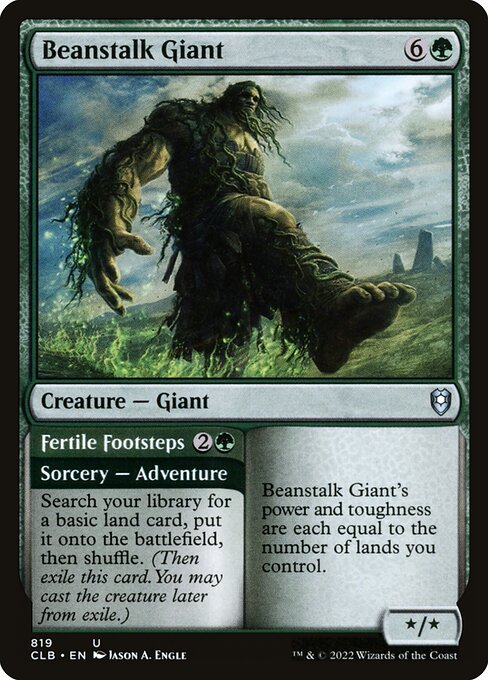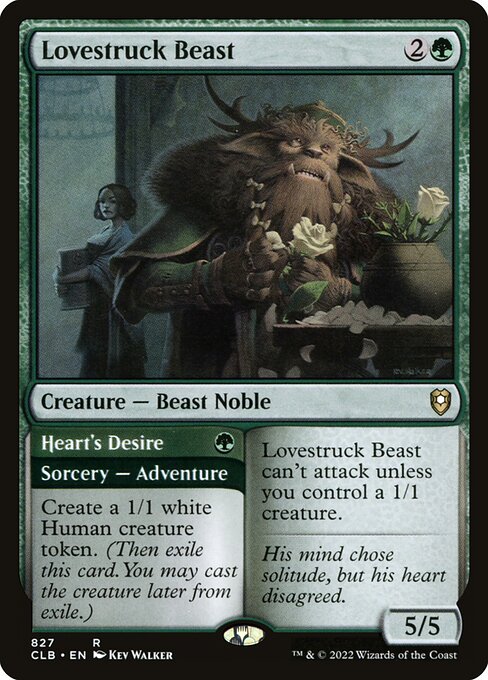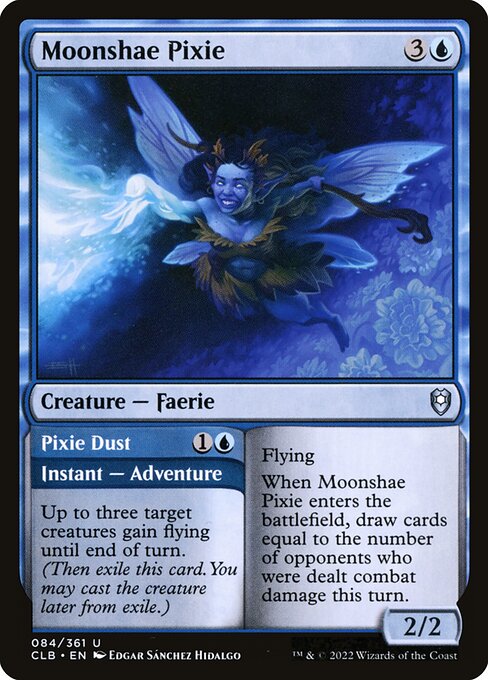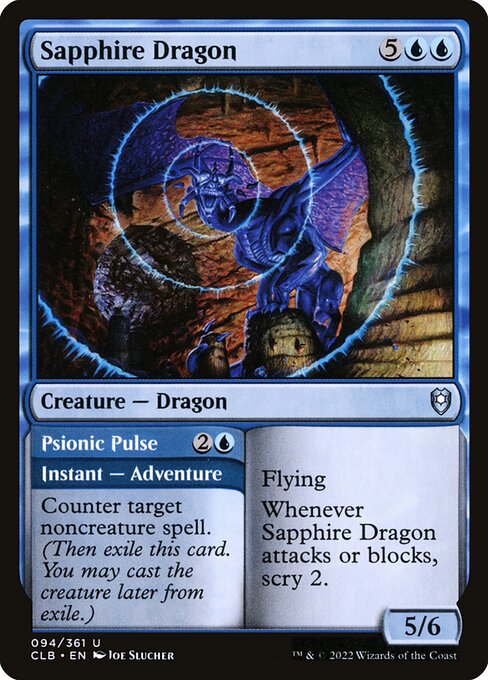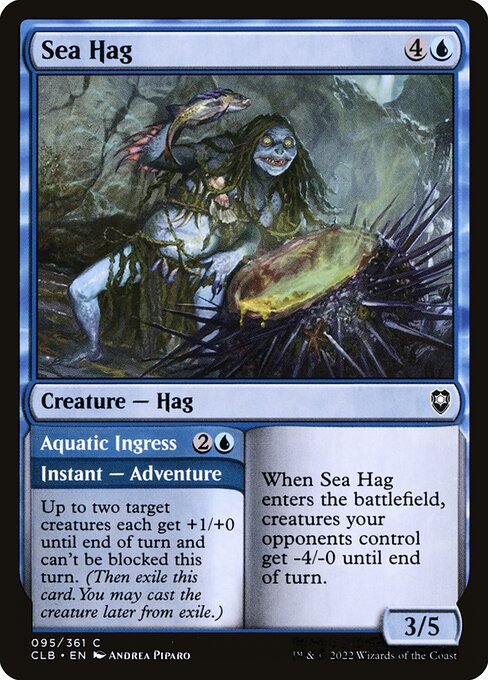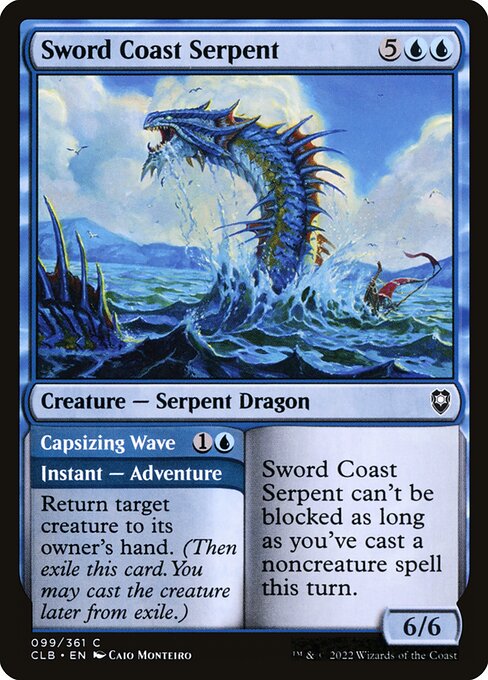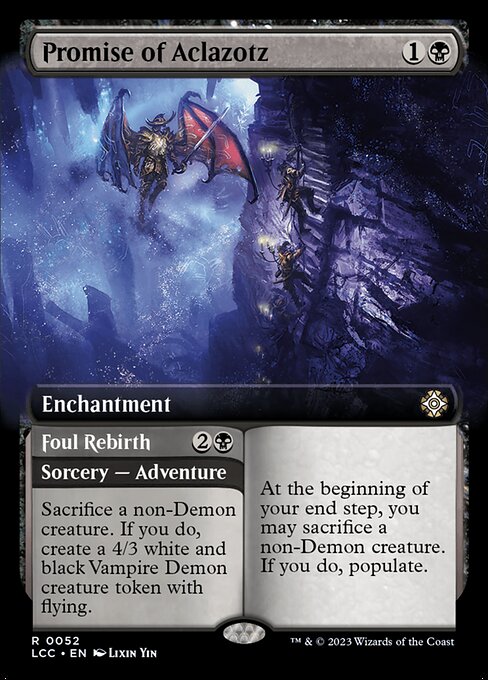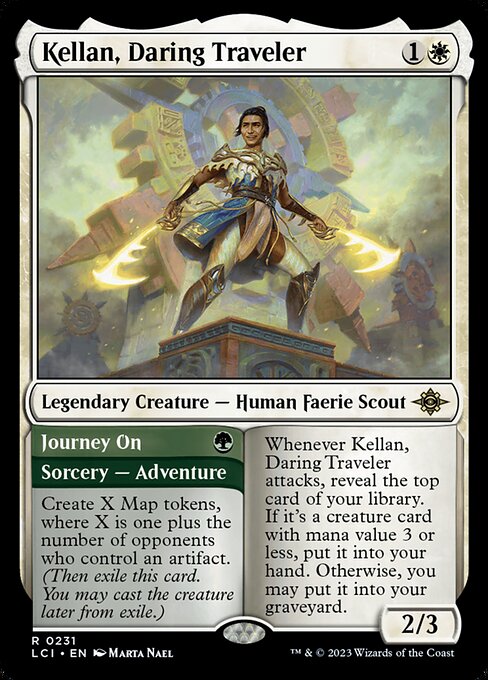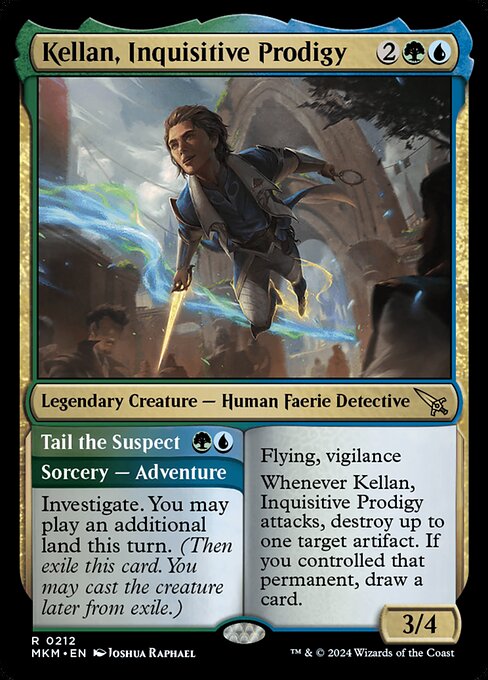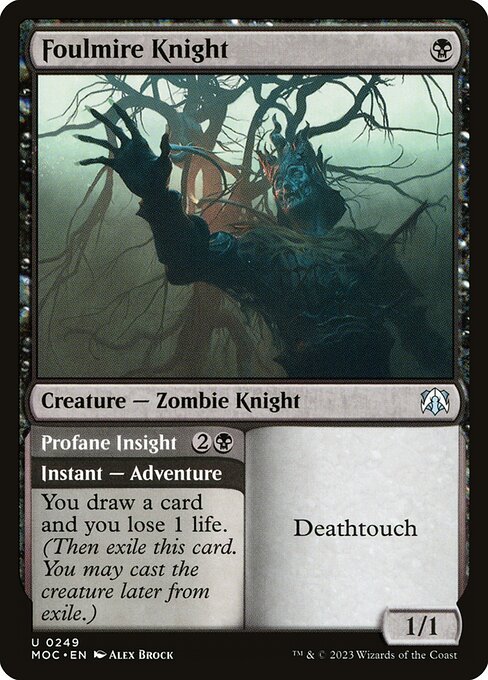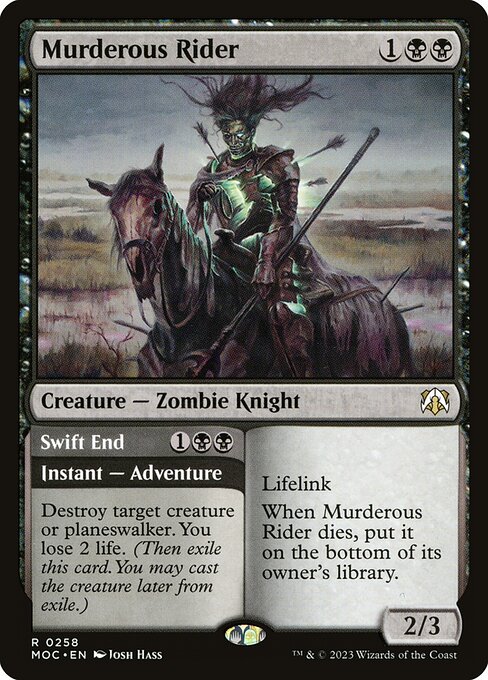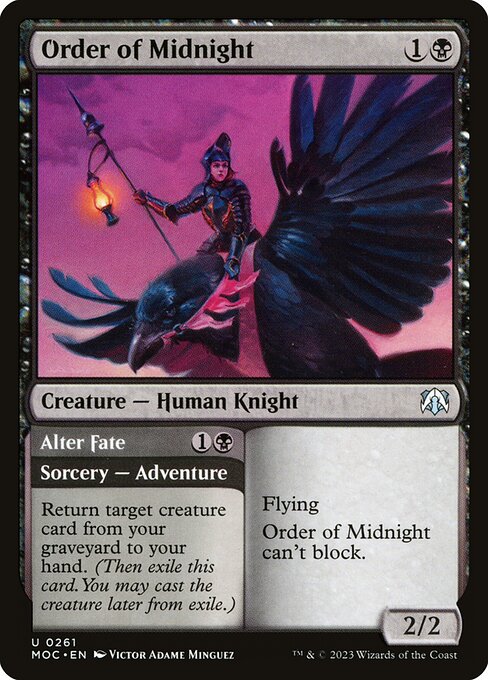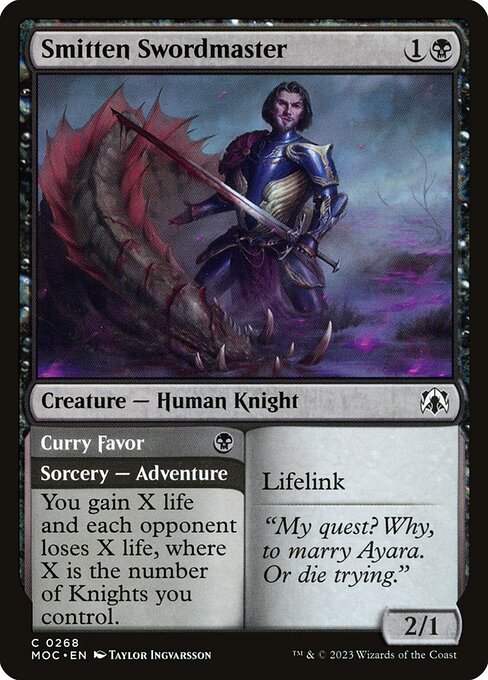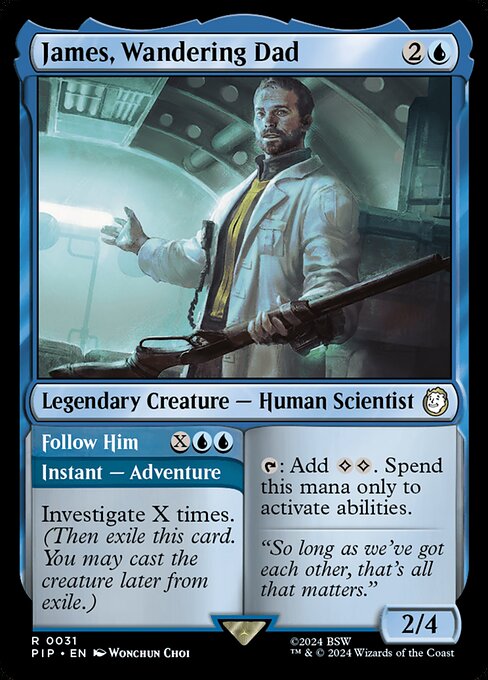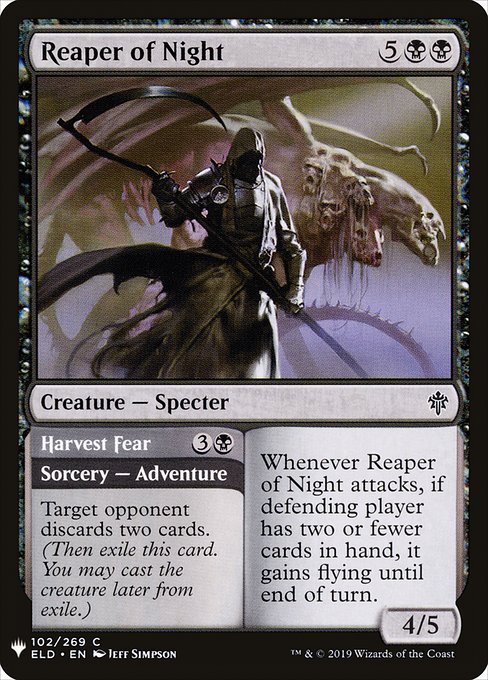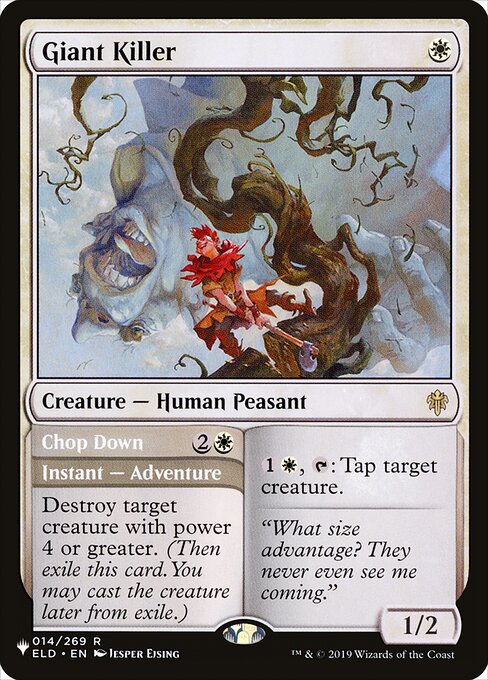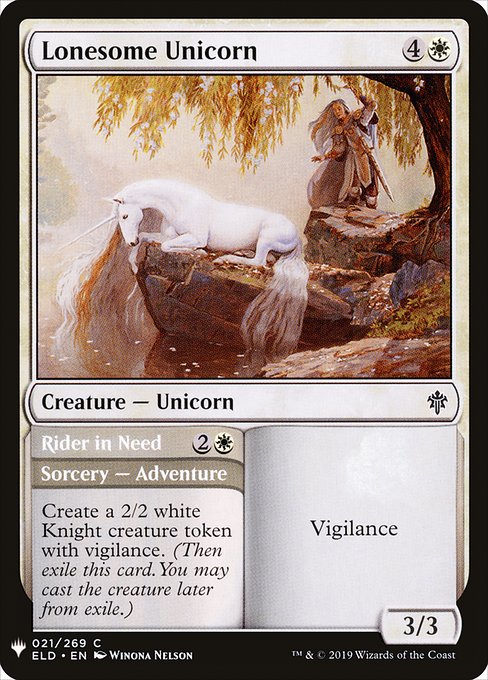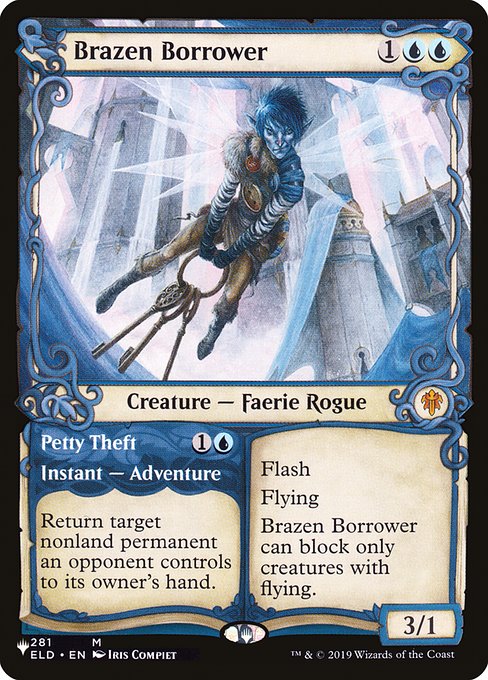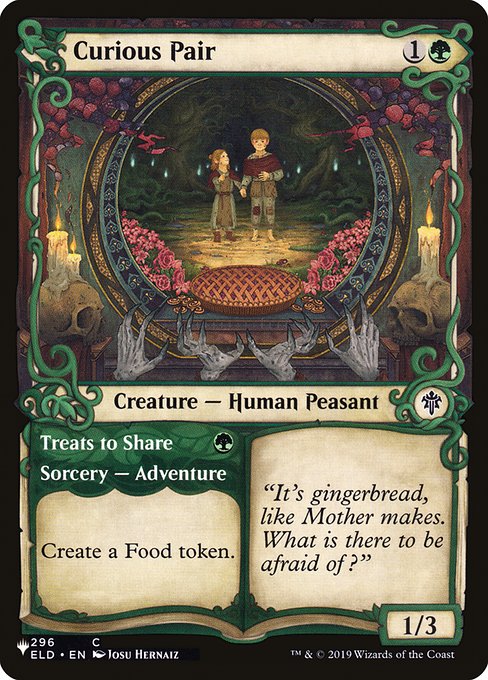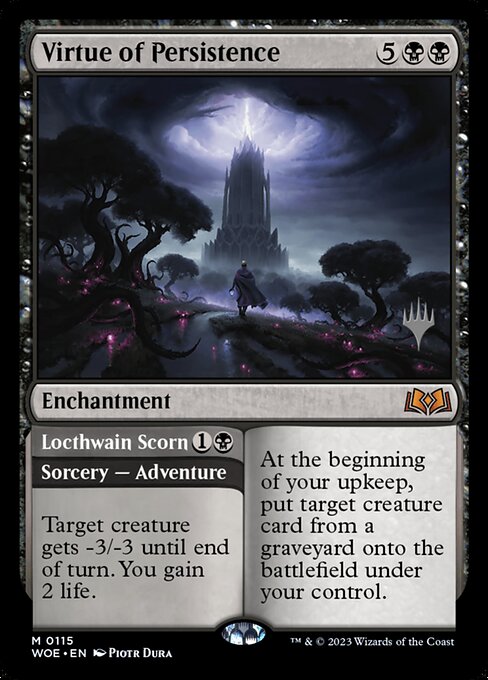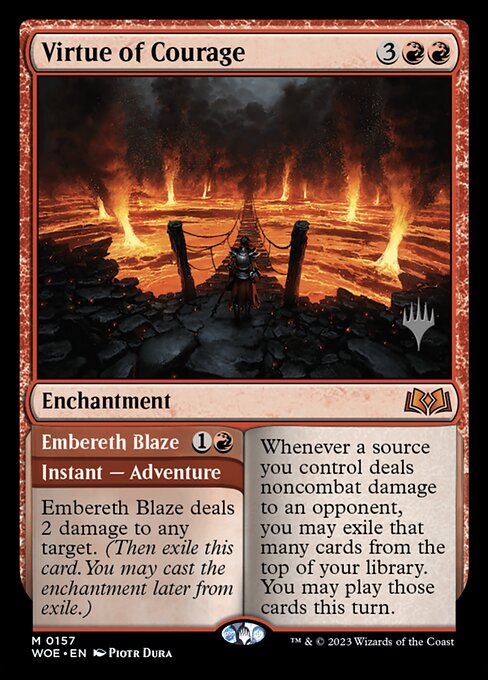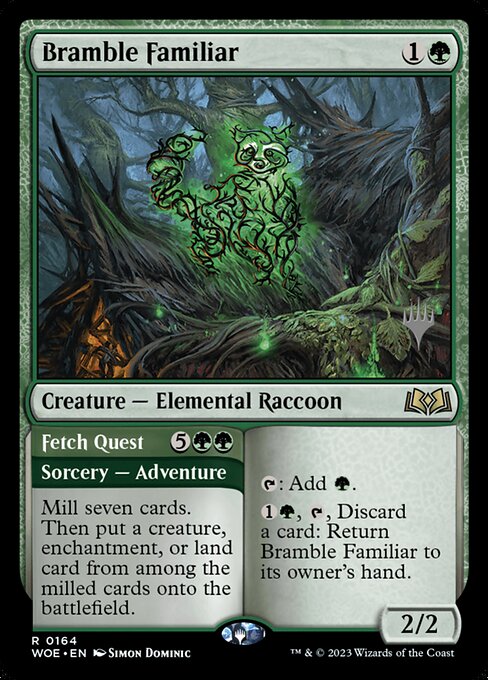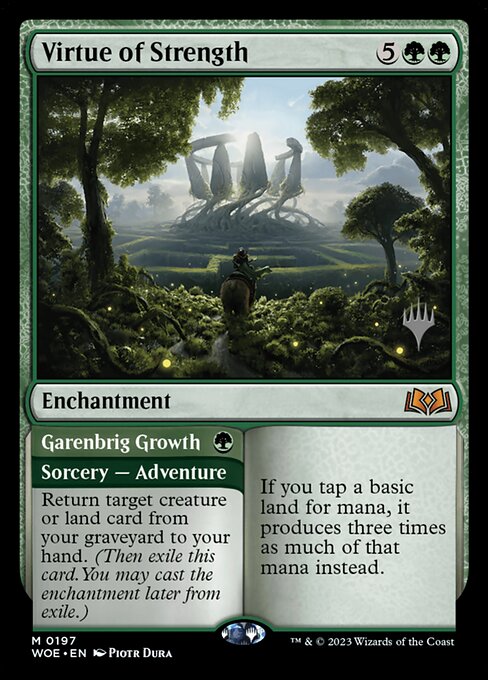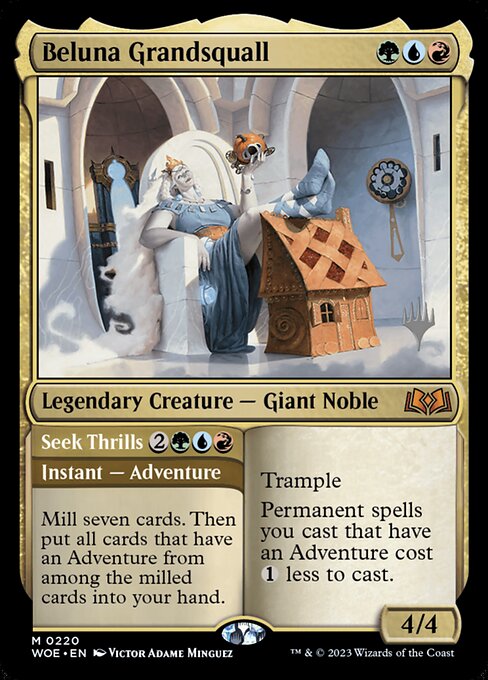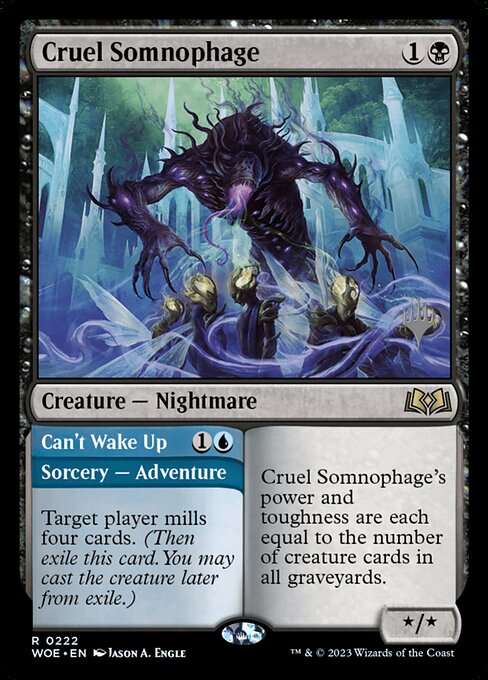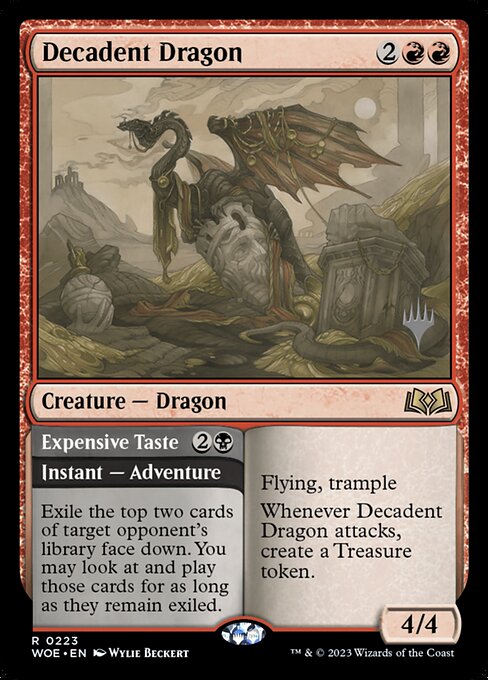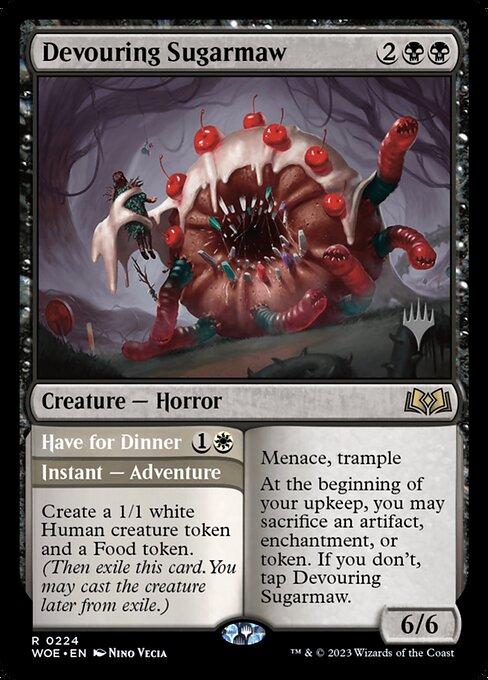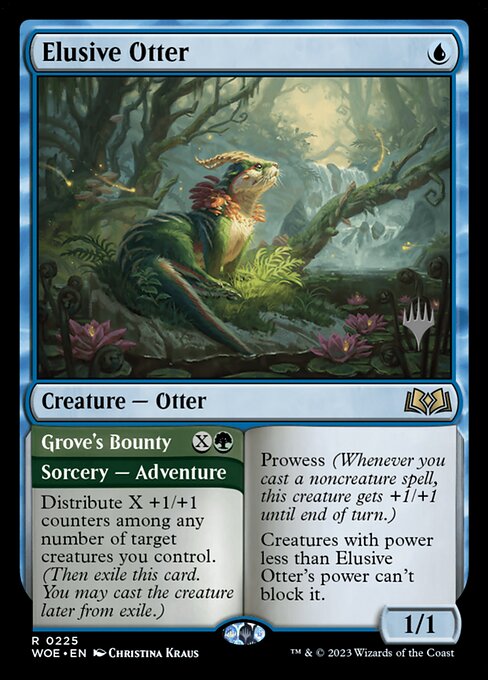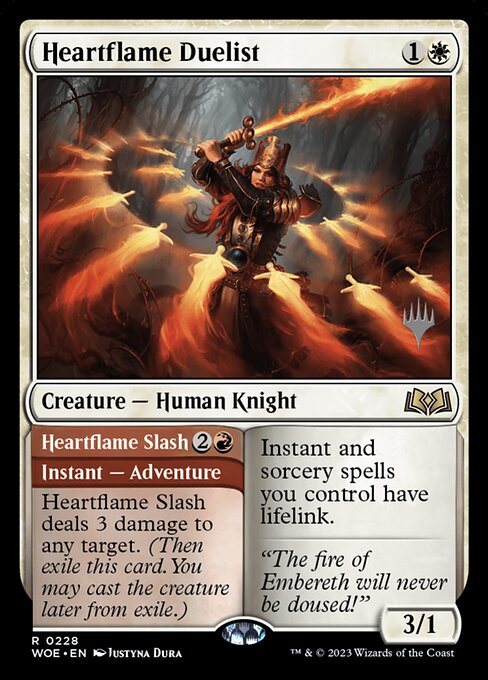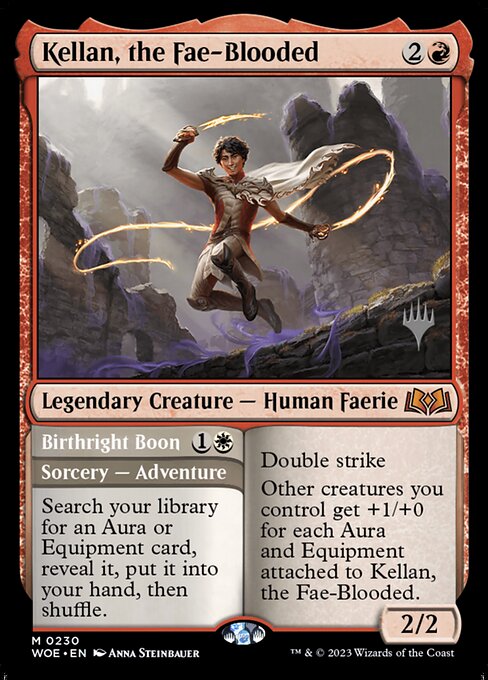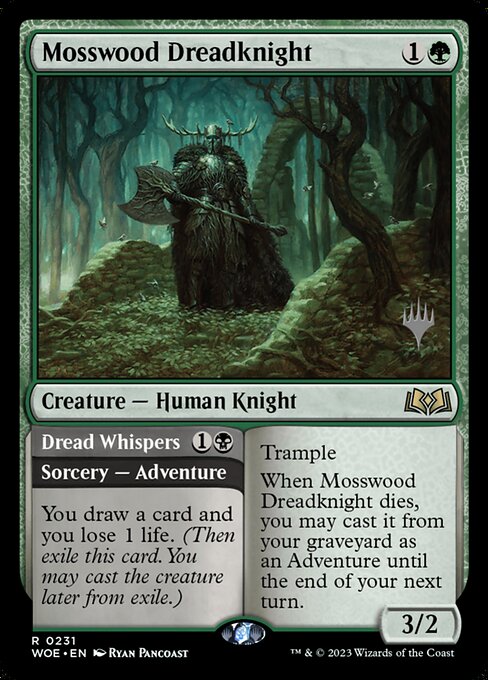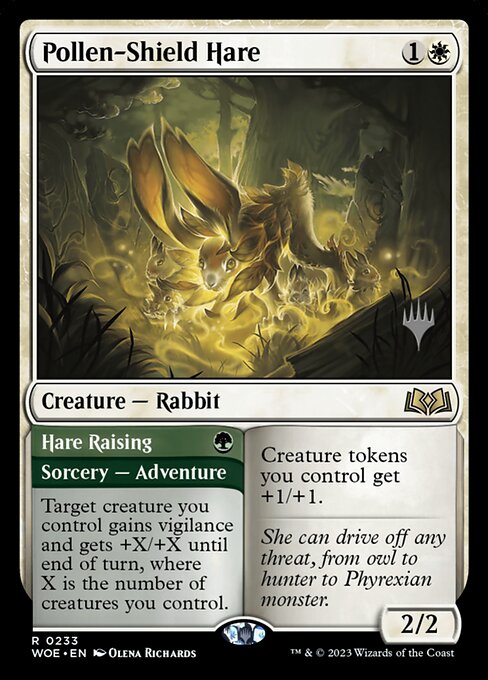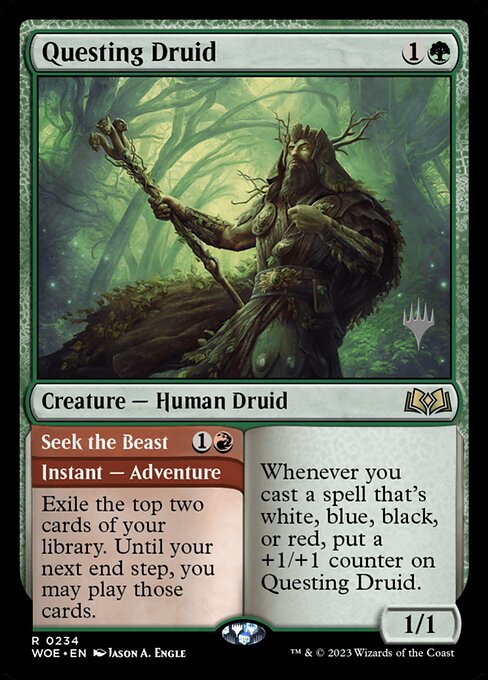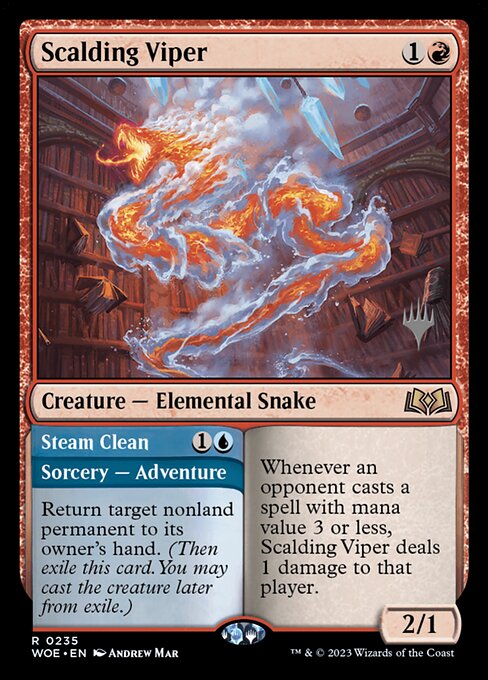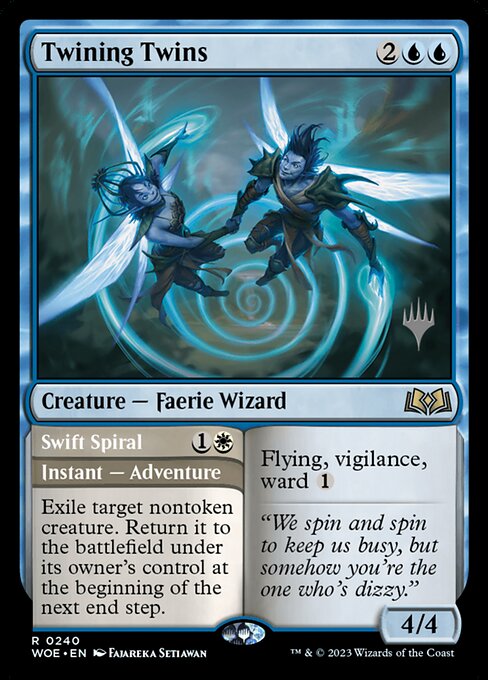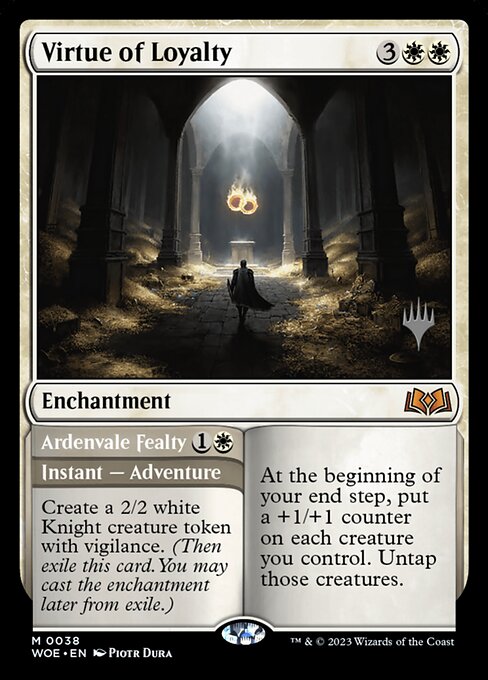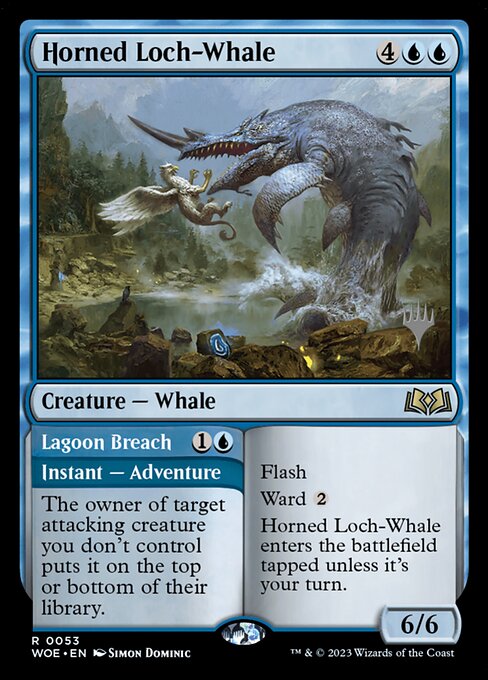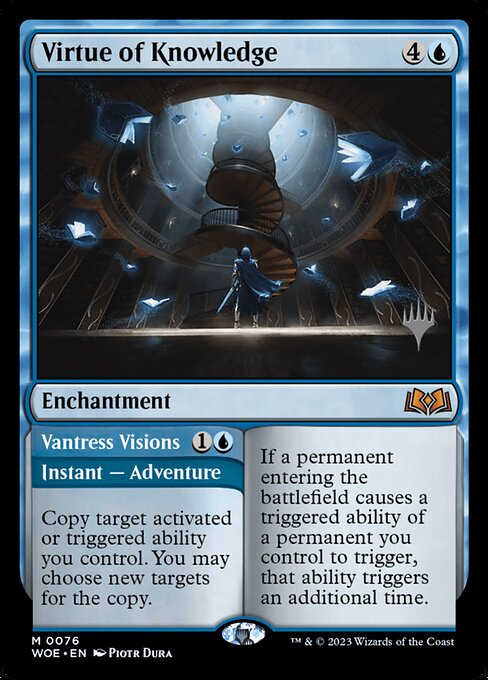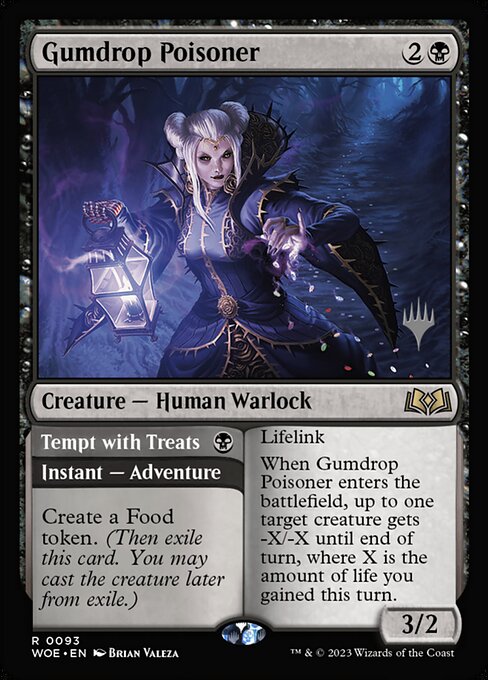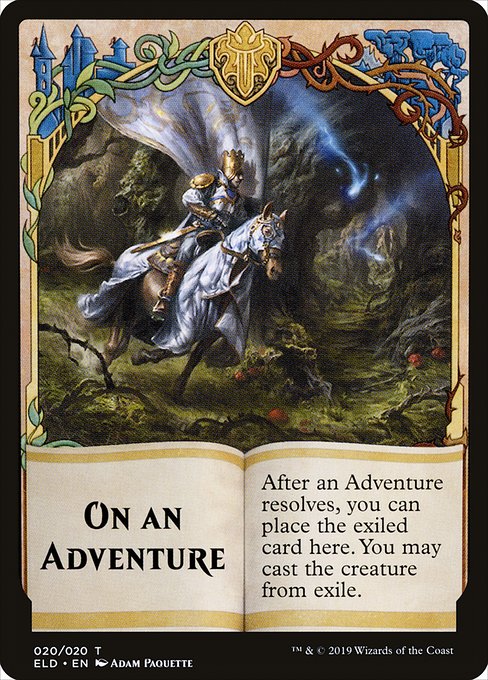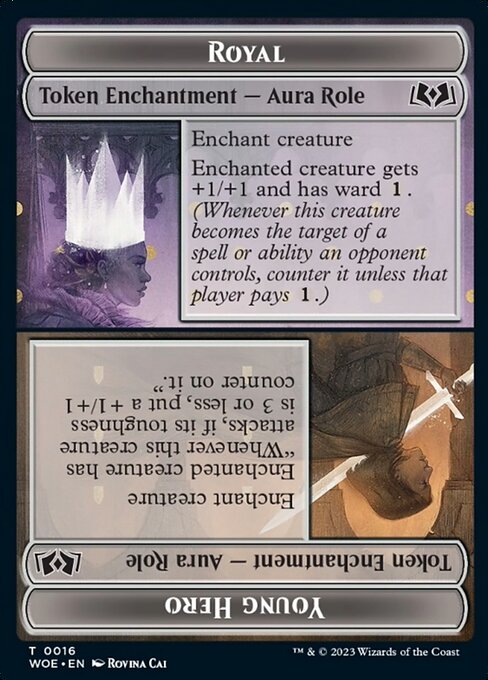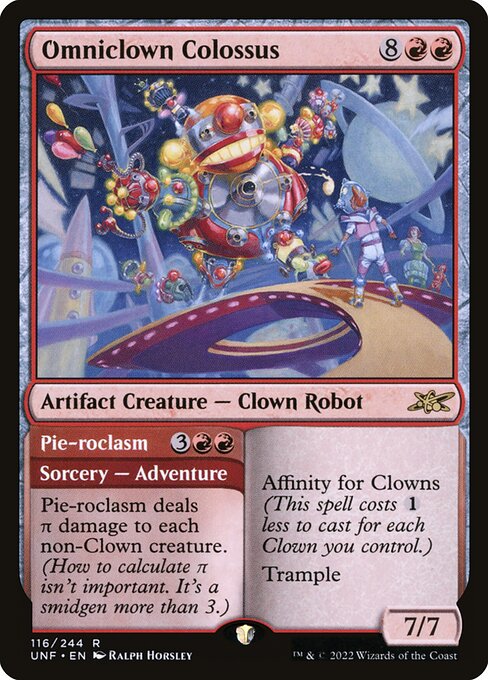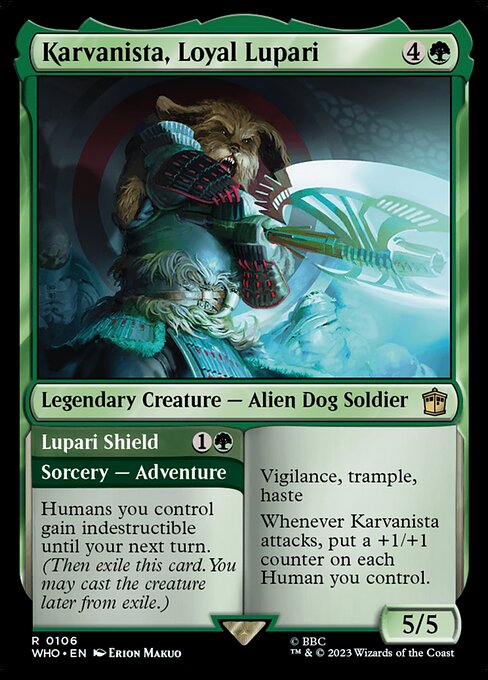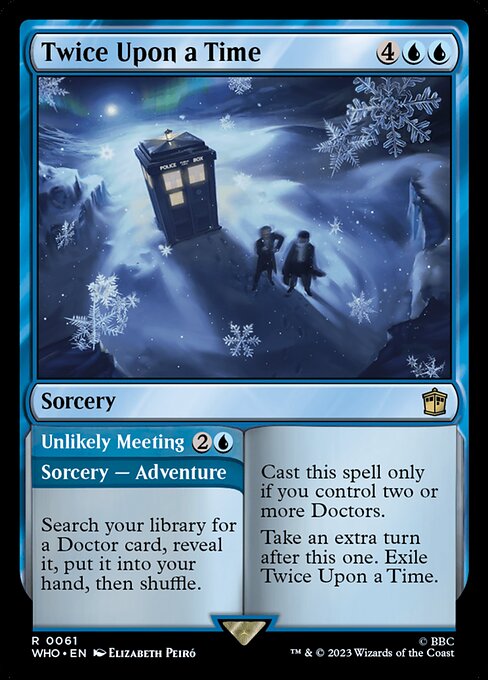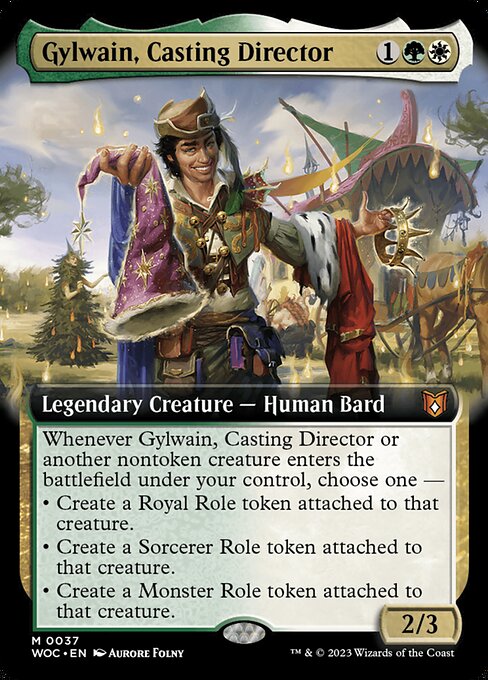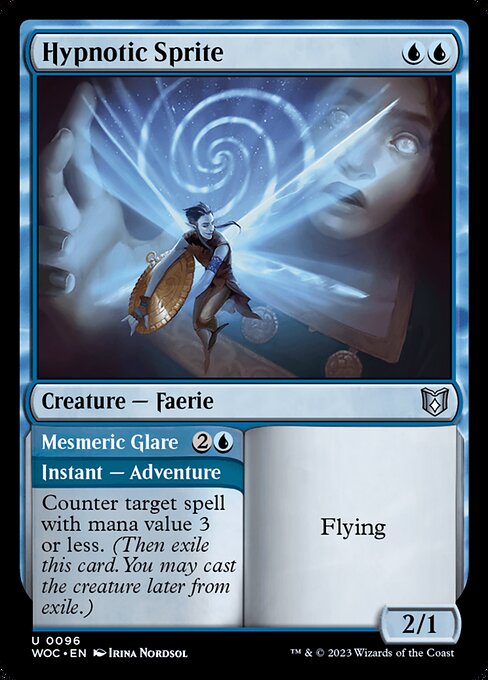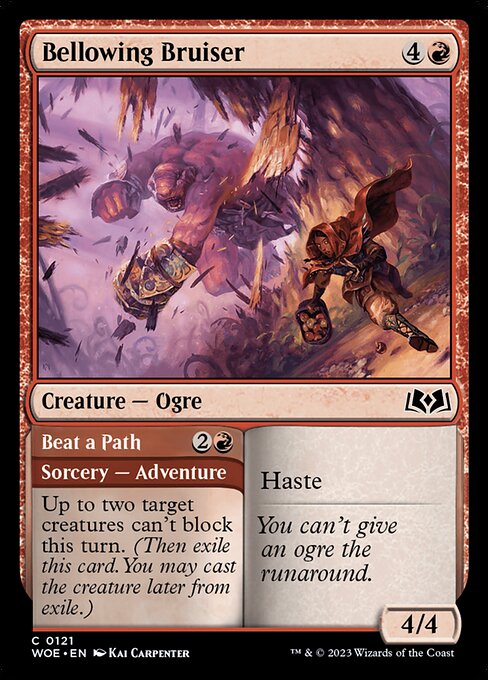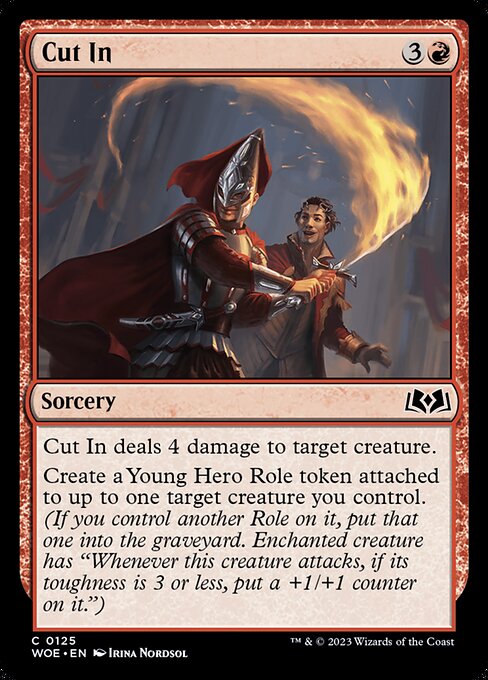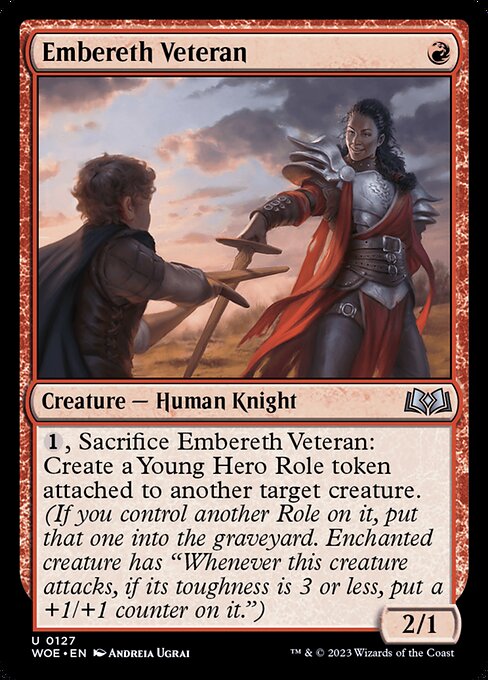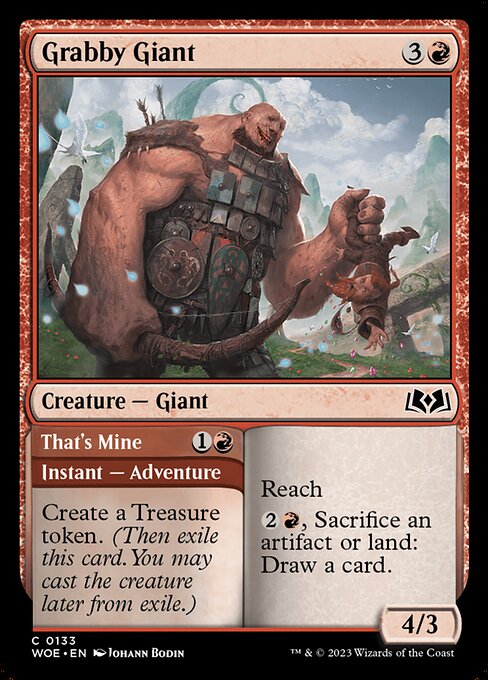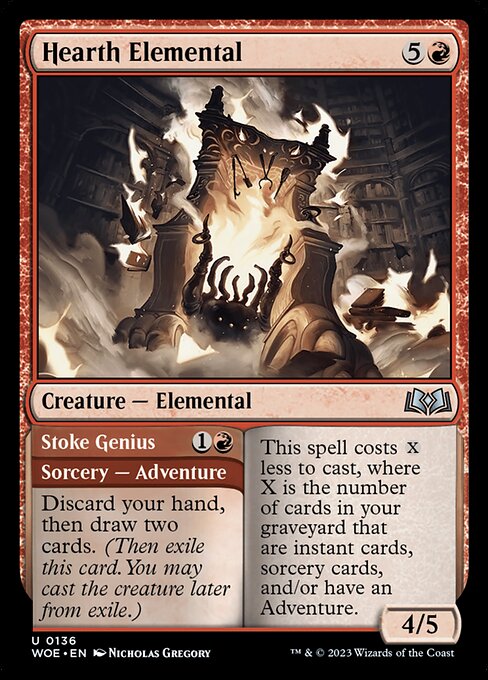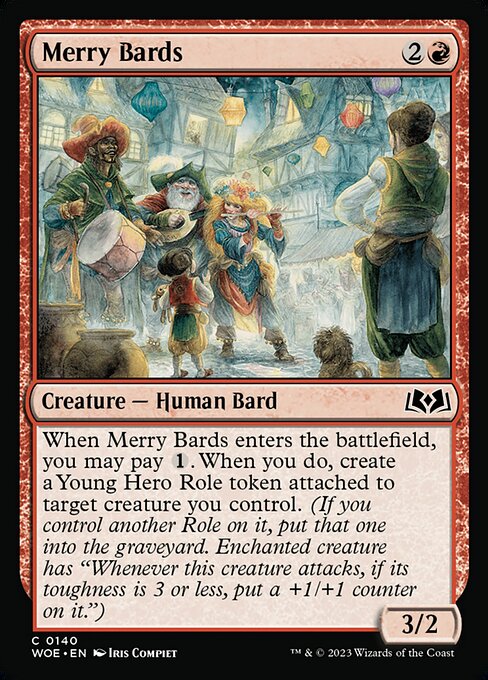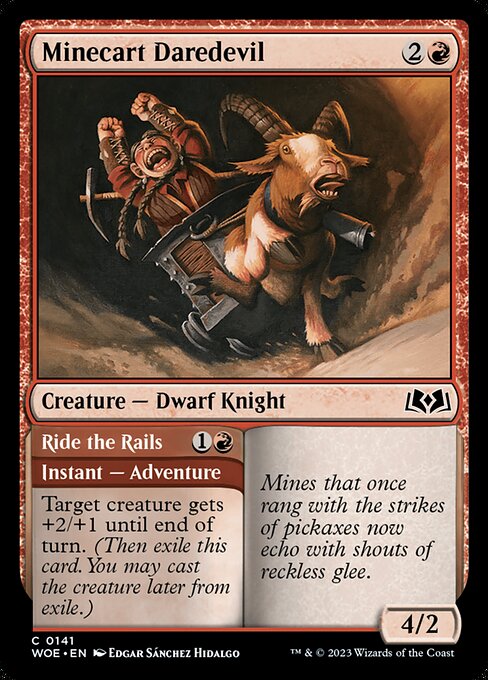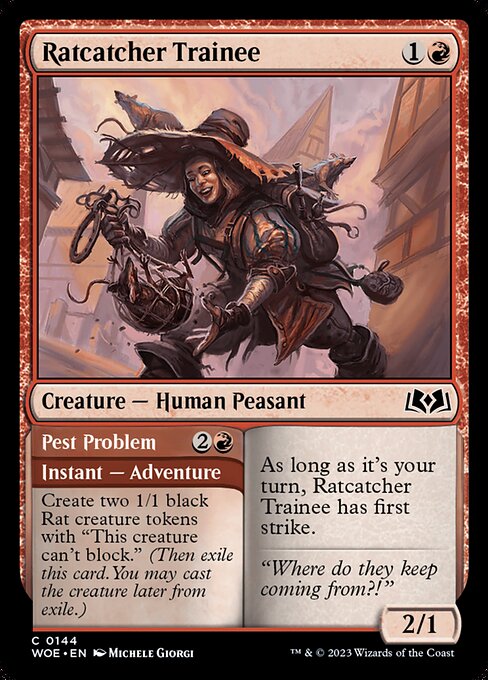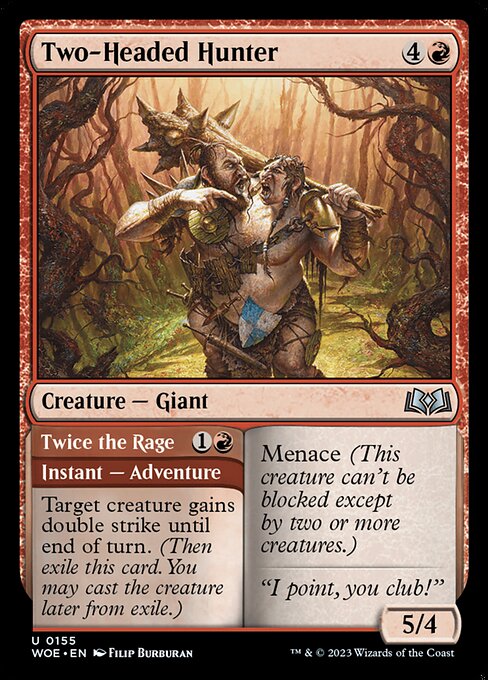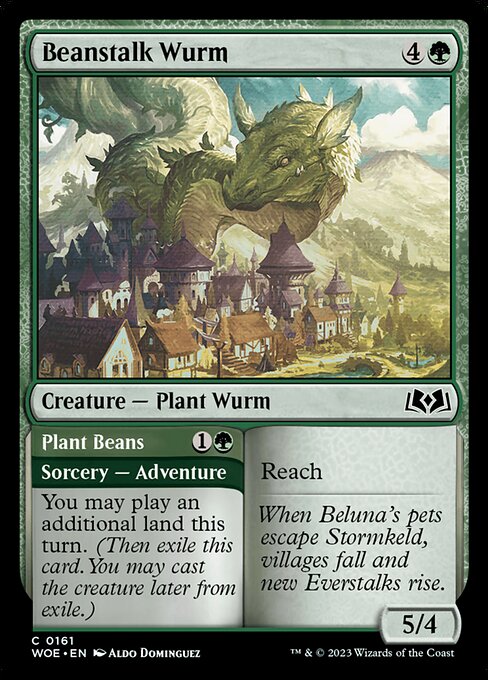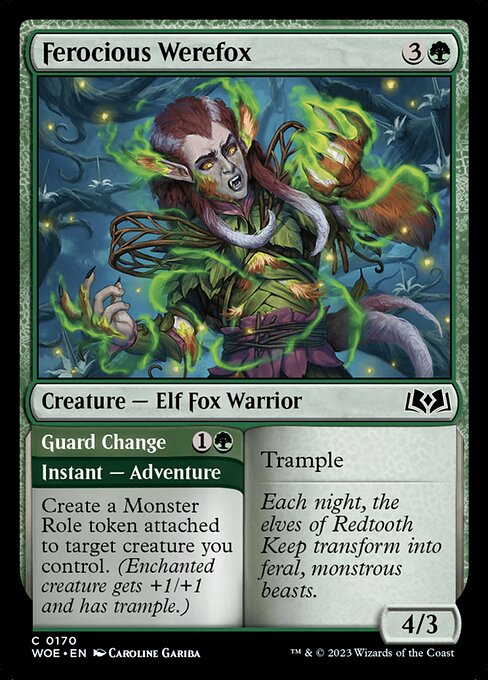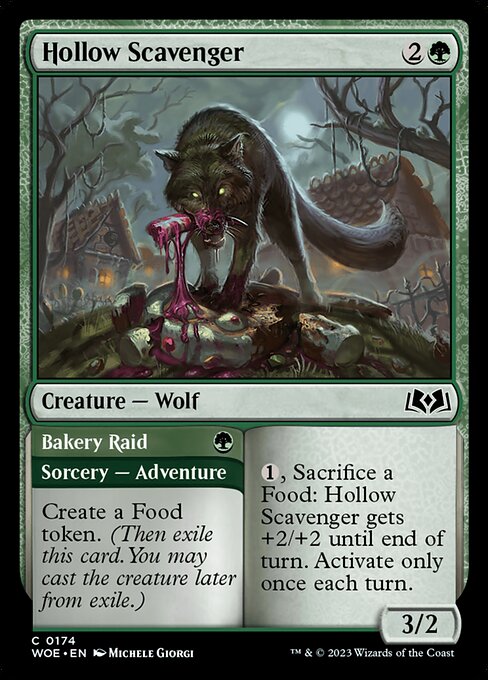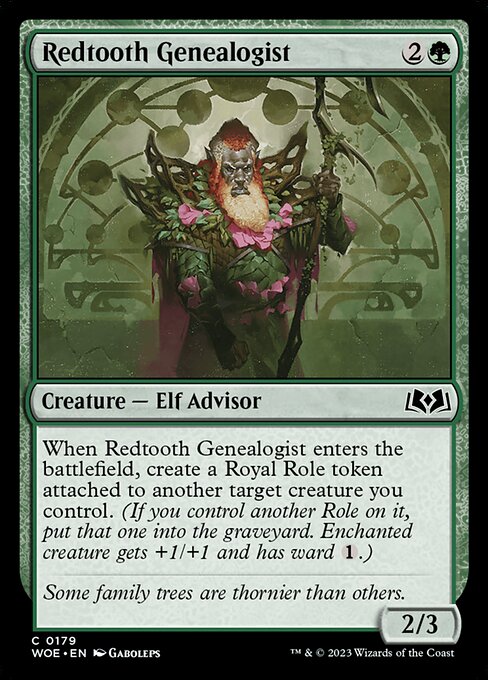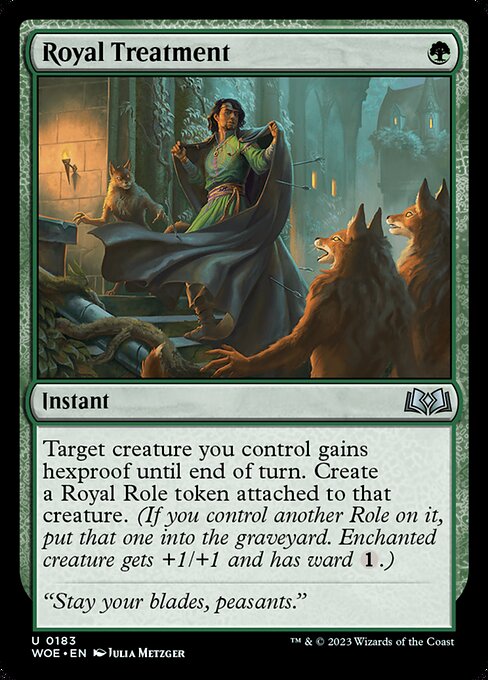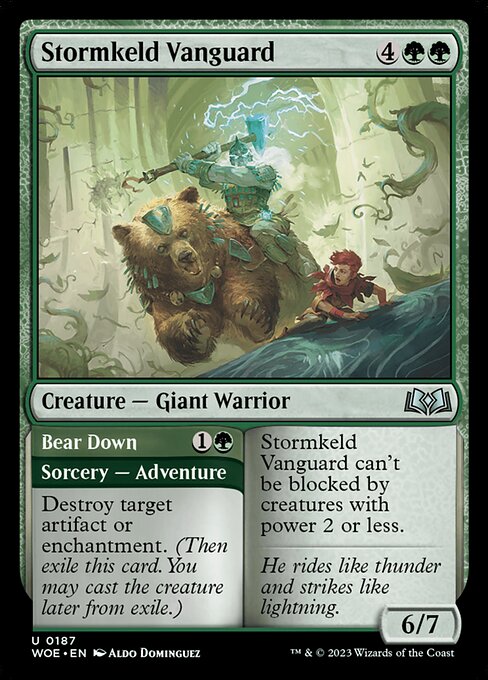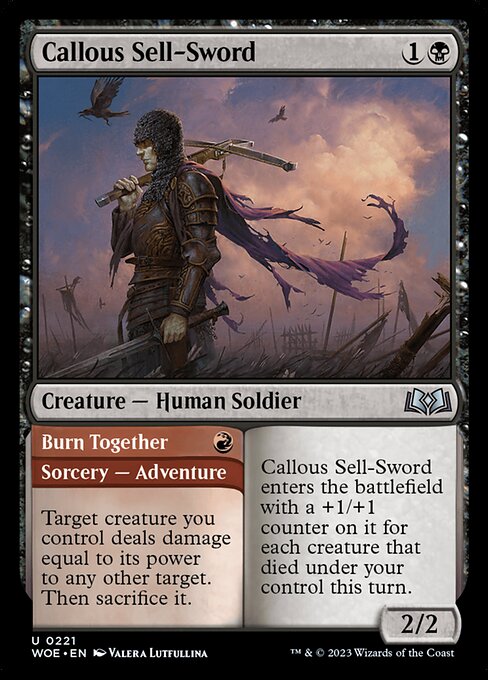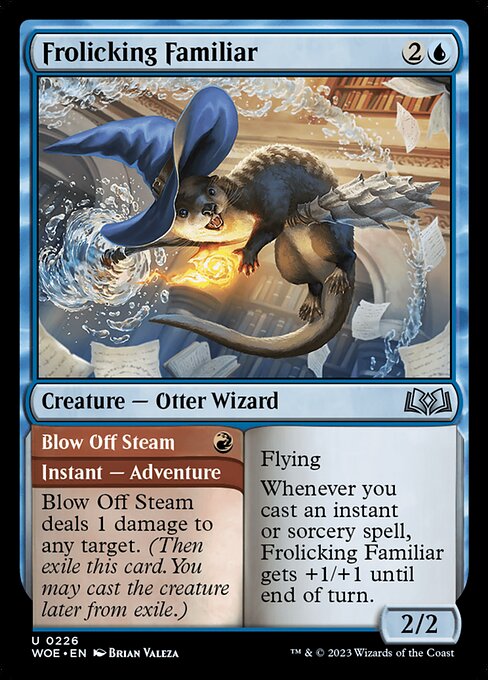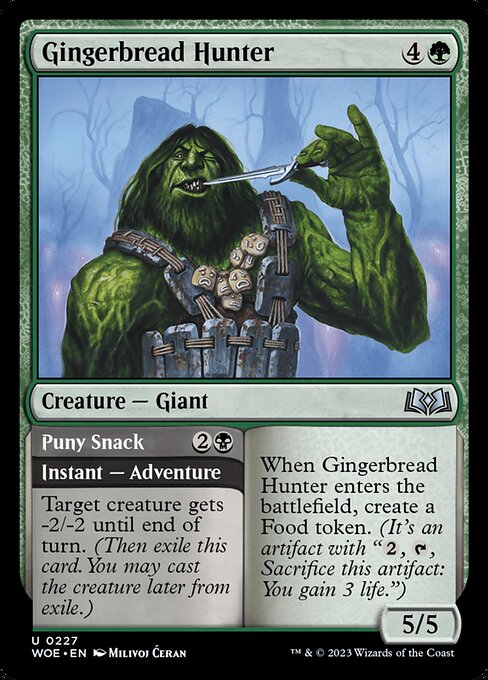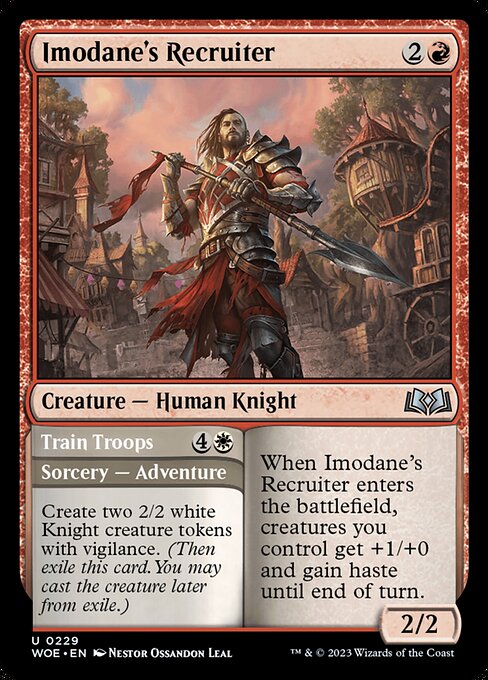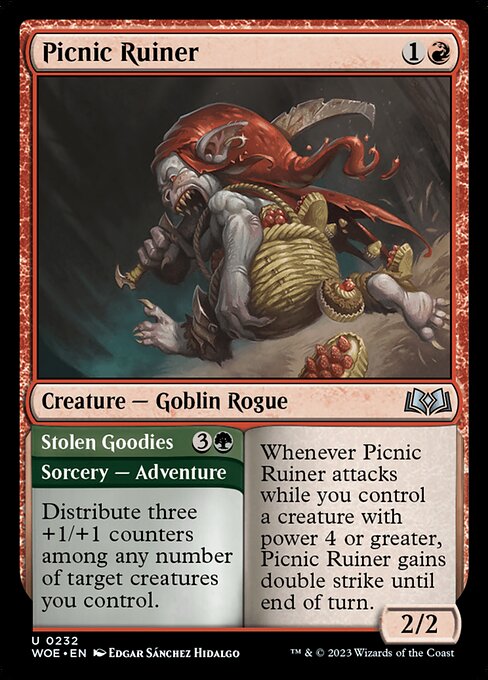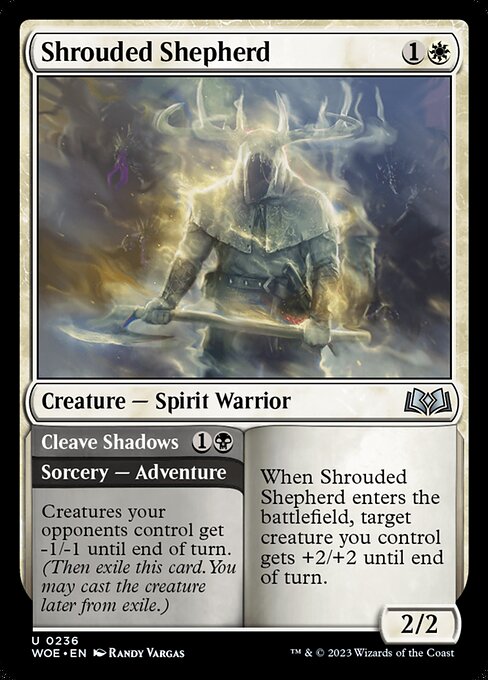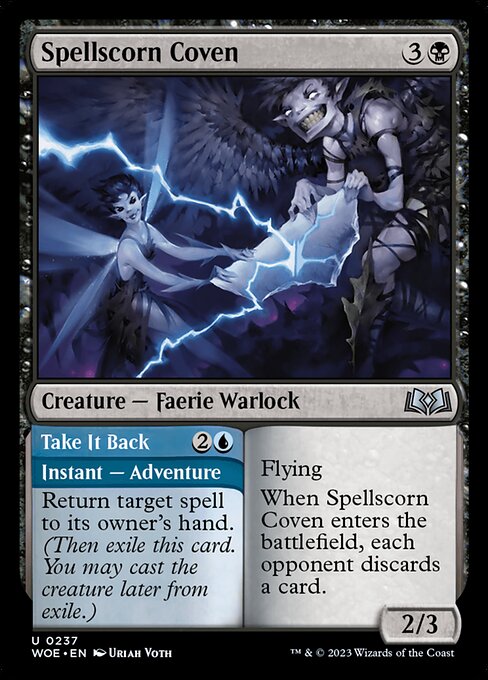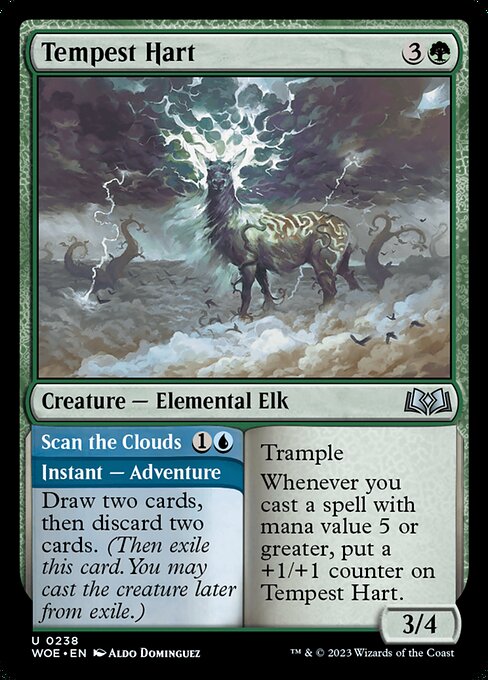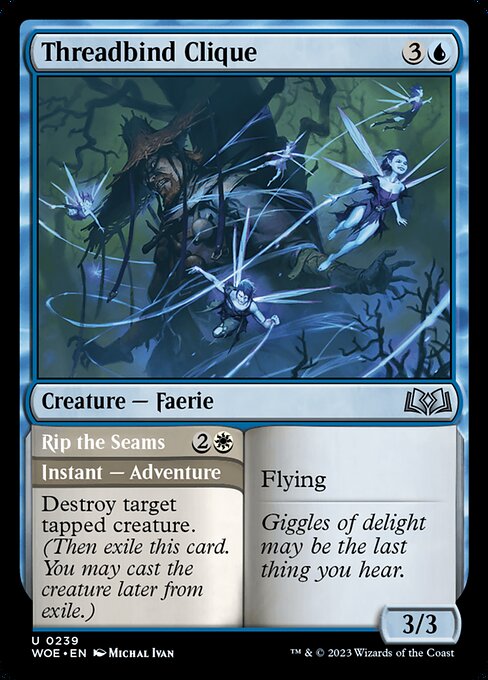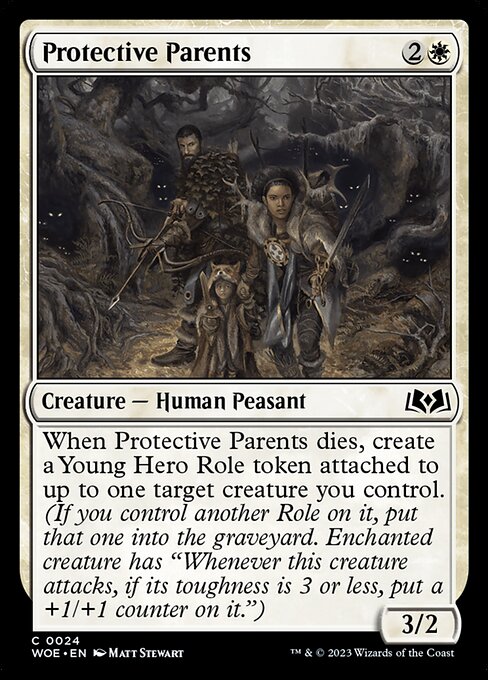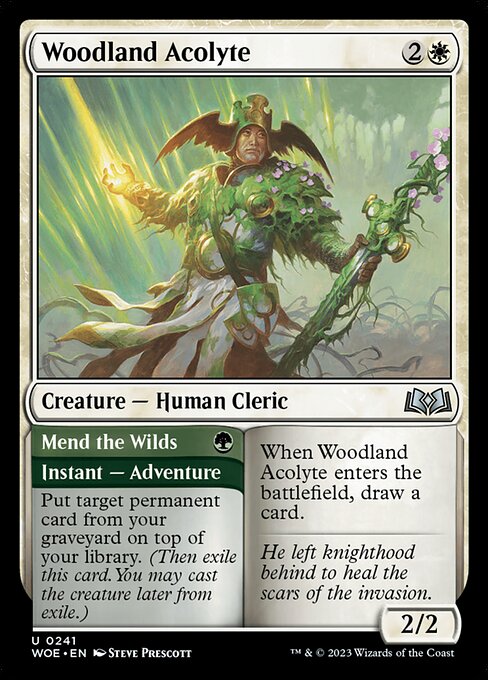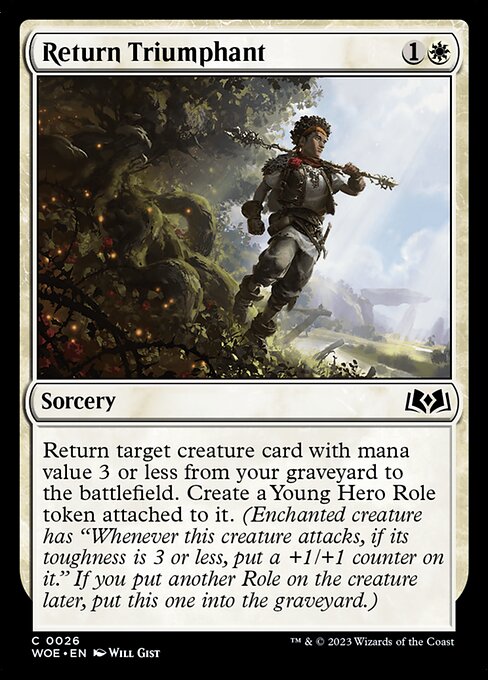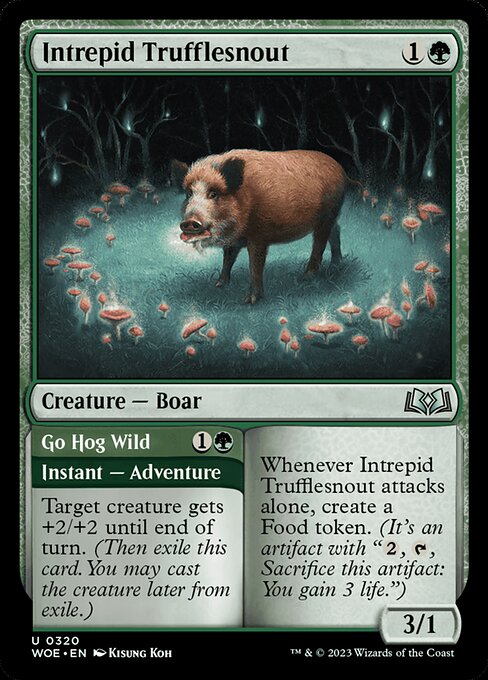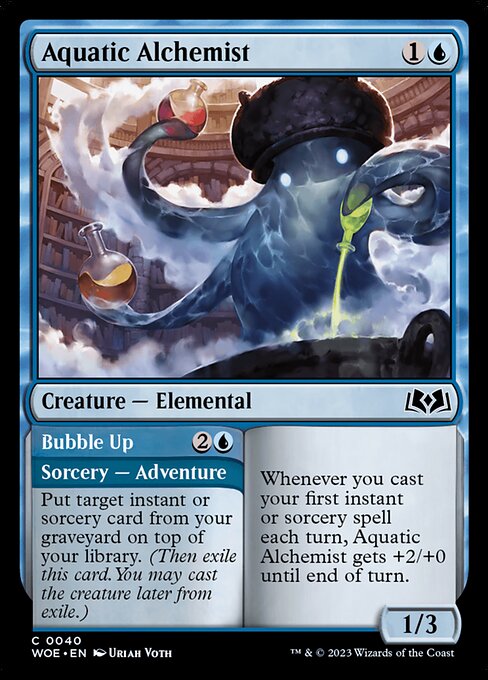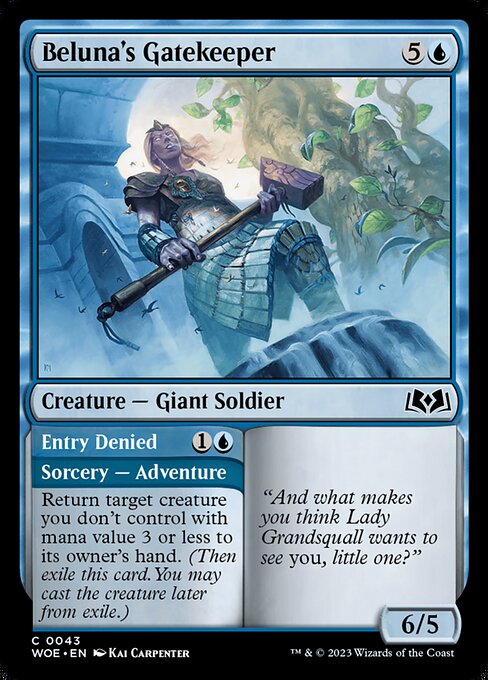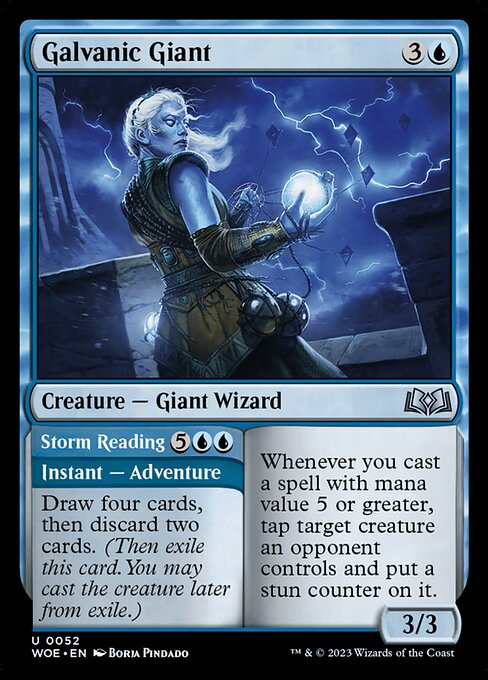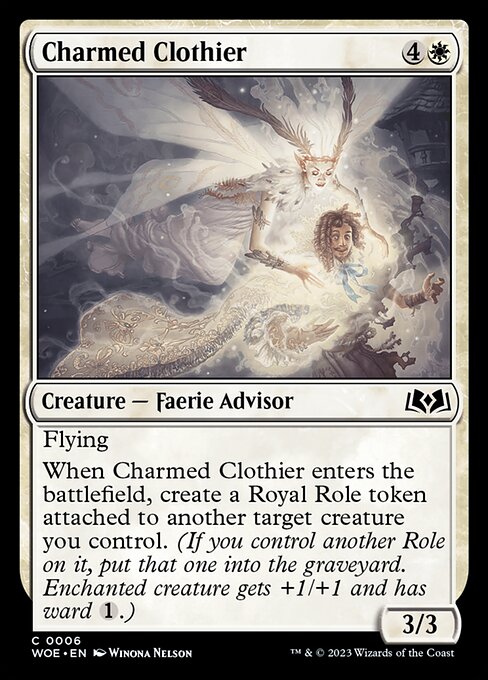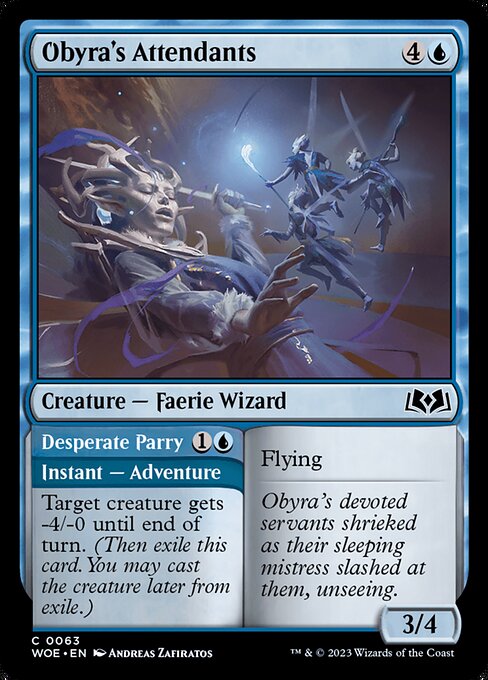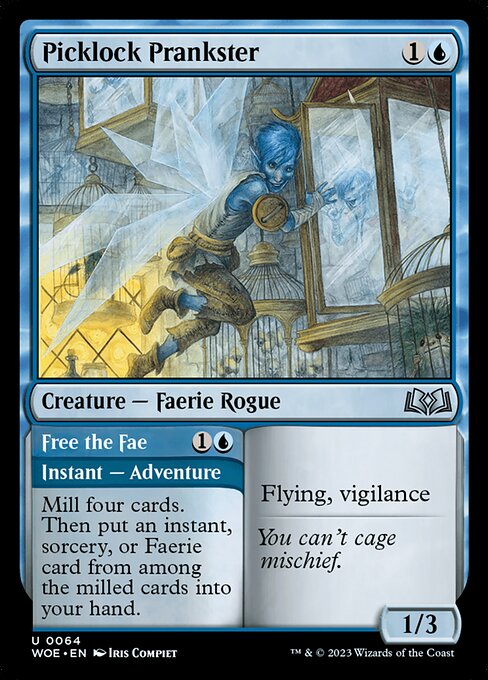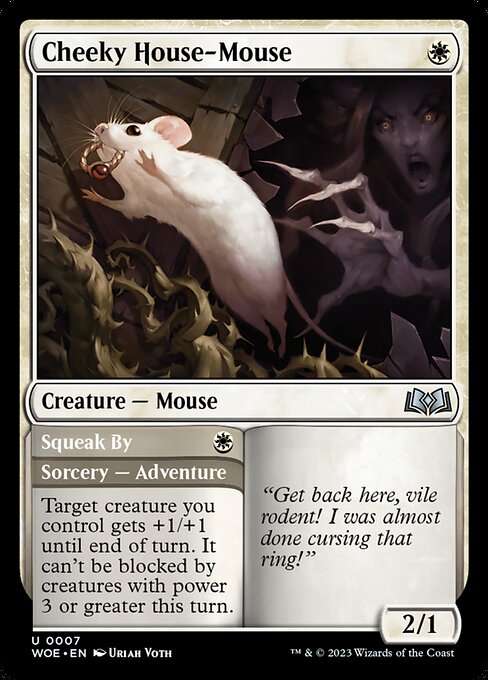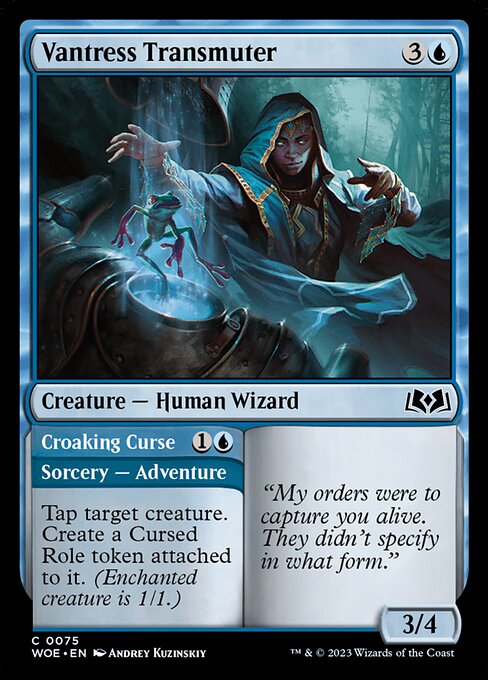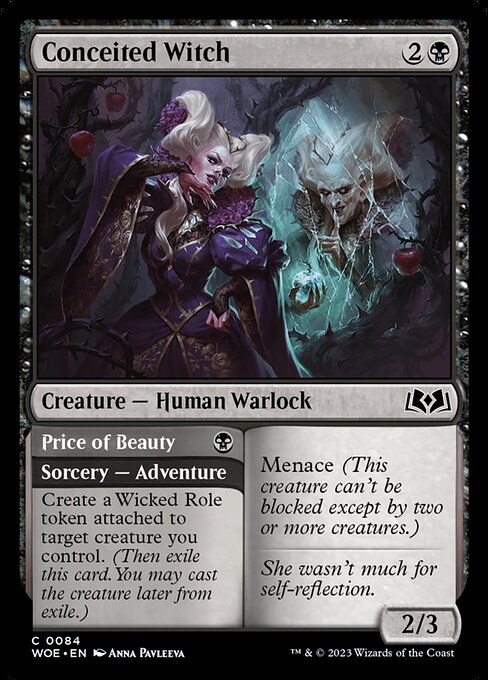standard
future
historic
gladiator
pioneer
explorer
modern
legacy
pauper
vintage
penny
commander
brawl
alchemy
paupercommander
duel
oldschool
premodern
Rulings
You must still follow any timing restrictions and permissions for the permanent spell you cast from exile. Normally, you’ll be able to cast it only during your main phase while the stack is empty.
Casting a card as an Adventure isn’t casting it for an alternative cost. Effects that allow you to cast a spell for an alternative cost or without paying its mana cost may allow you to apply those to the Adventure.
If an effect refers to a card, spell, or permanent that has an Adventure, it won’t find an instant or sorcery spell on the stack that’s been cast as an Adventure.
If an effect instructs you to choose a card name, you may choose the alternative Adventure name. Consider only the alternative characteristics to determine whether that is an appropriate name to choose.
If an adventurer card ends up in exile for any other reason than by exiling itself while resolving, it won’t give you permission to cast it as a permanent spell.
If two or more Roles controlled by the same player become attached to a permanent at the same time (perhaps due to an effect such as that of Doubling Season), that player chooses which one to keep and which are put into their owners’ graveyards.
In rare cases, a spell or ability might attempt to create a Role token enchanting a permanent that it can’t legally enchant (because of an ability like protection from enchantments). In such cases, the Role token isn’t created.
If a spell is cast as an Adventure, its controller exiles it instead of putting it into its owner’s graveyard as it resolves. For as long as it remains exiled, that player may cast it as a permanent spell. If an Adventure spell leaves the stack in any way other than resolving (most likely by being countered or by failing to resolve because its targets have all become illegal), that card won’t be exiled and the spell’s controller won’t be able to cast it as a permanent later.
When casting a spell as an Adventure, use the alternative characteristics and ignore all of the card’s normal characteristics. The spell’s color, mana cost, mana value, and so on are determined by only those alternative characteristics. If the spell leaves the stack, it immediately resumes using its normal characteristics.
Cards in the Wilds of Eldraine main set create six different Role tokens: Cursed, Monster, Royal, Sorcerer, Wicked, and Young Hero. A seventh Role token, Virtuous, is created by Ellivere of the Wild Court, the commander of the “Virtue and Valor” Commander Deck.
If you cast an adventurer card as an Adventure, use only its alternative characteristics to determine whether it’s legal to cast that spell. For example, if you control Johann, Apprentice Sorcerer (“Once each turn, you may cast an instant or sorcery spell from the top of your library.”) and Questing Druid is on top of your library, you can cast Seek the Beast, but not Questing Druid.
Roles are colorless enchantment tokens. Each one has the Aura and Role subtypes and the enchant creature ability.
An adventurer card is a permanent card in every zone except the stack, as well as while on the stack if not cast as an Adventure. Ignore its alternative characteristics in those cases. For example, while it’s in your graveyard, Questing Druid is a green creature card whose mana value is 2. It can’t be the target of Tenacious Tomeseeker’s triggered ability (“return target instant or sorcery card from your graveyard to your hand”).
If an object becomes a copy of an object that has an Adventure, the copy also has an Adventure. If it changes zones, it will either cease to exist (if it’s a token) or cease to be a copy (if it’s a nontoken permanent), and so you won’t be able to cast it as an Adventure.
An effect may refer to a card, spell, or permanent that “has an Adventure.” This refers to a card, spell, or permanent that has an adventurer card’s set of alternative characteristics, even if they’re not being used and even if that card was never cast as an Adventure.
If an effect copies an Adventure spell, that copy is exiled as it resolves. It ceases to exist as a state-based action; it’s not possible to cast the copy as a permanent.
A permanent can have multiple Roles attached to it if each one is controlled by a different player.
If a permanent has more than one Role attached to it controlled by the same player, each of those Roles except the one with the most recent timestamp is put into its owner’s graveyard. This is a state-based action.
Some spells and abilities that create Role tokens require targets. If each target chosen is an illegal target as that spell or ability tries to resolve, it won’t resolve. The Role token won’t be created.
Hexproof and shroud won’t prevent a Role from becoming attached to a permanent if the ability creating that Role attached to that permanent doesn’t target it.
Casting a card as an Adventure isn’t casting it for an alternative cost. Effects that allow you to cast a spell for an alternative cost or without paying its mana cost may allow you to apply those to the Adventure.
If an effect refers to a card, spell, or permanent that has an Adventure, it won’t find an instant or sorcery spell on the stack that’s been cast as an Adventure.
If an effect instructs you to choose a card name, you may choose the alternative Adventure name. Consider only the alternative characteristics to determine whether that is an appropriate name to choose.
If an adventurer card ends up in exile for any other reason than by exiling itself while resolving, it won’t give you permission to cast it as a permanent spell.
If two or more Roles controlled by the same player become attached to a permanent at the same time (perhaps due to an effect such as that of Doubling Season), that player chooses which one to keep and which are put into their owners’ graveyards.
In rare cases, a spell or ability might attempt to create a Role token enchanting a permanent that it can’t legally enchant (because of an ability like protection from enchantments). In such cases, the Role token isn’t created.
If a spell is cast as an Adventure, its controller exiles it instead of putting it into its owner’s graveyard as it resolves. For as long as it remains exiled, that player may cast it as a permanent spell. If an Adventure spell leaves the stack in any way other than resolving (most likely by being countered or by failing to resolve because its targets have all become illegal), that card won’t be exiled and the spell’s controller won’t be able to cast it as a permanent later.
When casting a spell as an Adventure, use the alternative characteristics and ignore all of the card’s normal characteristics. The spell’s color, mana cost, mana value, and so on are determined by only those alternative characteristics. If the spell leaves the stack, it immediately resumes using its normal characteristics.
Cards in the Wilds of Eldraine main set create six different Role tokens: Cursed, Monster, Royal, Sorcerer, Wicked, and Young Hero. A seventh Role token, Virtuous, is created by Ellivere of the Wild Court, the commander of the “Virtue and Valor” Commander Deck.
If you cast an adventurer card as an Adventure, use only its alternative characteristics to determine whether it’s legal to cast that spell. For example, if you control Johann, Apprentice Sorcerer (“Once each turn, you may cast an instant or sorcery spell from the top of your library.”) and Questing Druid is on top of your library, you can cast Seek the Beast, but not Questing Druid.
Roles are colorless enchantment tokens. Each one has the Aura and Role subtypes and the enchant creature ability.
An adventurer card is a permanent card in every zone except the stack, as well as while on the stack if not cast as an Adventure. Ignore its alternative characteristics in those cases. For example, while it’s in your graveyard, Questing Druid is a green creature card whose mana value is 2. It can’t be the target of Tenacious Tomeseeker’s triggered ability (“return target instant or sorcery card from your graveyard to your hand”).
If an object becomes a copy of an object that has an Adventure, the copy also has an Adventure. If it changes zones, it will either cease to exist (if it’s a token) or cease to be a copy (if it’s a nontoken permanent), and so you won’t be able to cast it as an Adventure.
An effect may refer to a card, spell, or permanent that “has an Adventure.” This refers to a card, spell, or permanent that has an adventurer card’s set of alternative characteristics, even if they’re not being used and even if that card was never cast as an Adventure.
If an effect copies an Adventure spell, that copy is exiled as it resolves. It ceases to exist as a state-based action; it’s not possible to cast the copy as a permanent.
A permanent can have multiple Roles attached to it if each one is controlled by a different player.
If a permanent has more than one Role attached to it controlled by the same player, each of those Roles except the one with the most recent timestamp is put into its owner’s graveyard. This is a state-based action.
Some spells and abilities that create Role tokens require targets. If each target chosen is an illegal target as that spell or ability tries to resolve, it won’t resolve. The Role token won’t be created.
Hexproof and shroud won’t prevent a Role from becoming attached to a permanent if the ability creating that Role attached to that permanent doesn’t target it.
Rulings
You must still follow any timing restrictions and permissions for the permanent spell you cast from exile. Normally, you’ll be able to cast it only during your main phase while the stack is empty.
Casting a card as an Adventure isn’t casting it for an alternative cost. Effects that allow you to cast a spell for an alternative cost or without paying its mana cost may allow you to apply those to the Adventure.
If an effect refers to a card, spell, or permanent that has an Adventure, it won’t find an instant or sorcery spell on the stack that’s been cast as an Adventure.
If an effect instructs you to choose a card name, you may choose the alternative Adventure name. Consider only the alternative characteristics to determine whether that is an appropriate name to choose.
If an adventurer card ends up in exile for any other reason than by exiling itself while resolving, it won’t give you permission to cast it as a permanent spell.
If two or more Roles controlled by the same player become attached to a permanent at the same time (perhaps due to an effect such as that of Doubling Season), that player chooses which one to keep and which are put into their owners’ graveyards.
In rare cases, a spell or ability might attempt to create a Role token enchanting a permanent that it can’t legally enchant (because of an ability like protection from enchantments). In such cases, the Role token isn’t created.
If a spell is cast as an Adventure, its controller exiles it instead of putting it into its owner’s graveyard as it resolves. For as long as it remains exiled, that player may cast it as a permanent spell. If an Adventure spell leaves the stack in any way other than resolving (most likely by being countered or by failing to resolve because its targets have all become illegal), that card won’t be exiled and the spell’s controller won’t be able to cast it as a permanent later.
When casting a spell as an Adventure, use the alternative characteristics and ignore all of the card’s normal characteristics. The spell’s color, mana cost, mana value, and so on are determined by only those alternative characteristics. If the spell leaves the stack, it immediately resumes using its normal characteristics.
Cards in the Wilds of Eldraine main set create six different Role tokens: Cursed, Monster, Royal, Sorcerer, Wicked, and Young Hero. A seventh Role token, Virtuous, is created by Ellivere of the Wild Court, the commander of the “Virtue and Valor” Commander Deck.
If you cast an adventurer card as an Adventure, use only its alternative characteristics to determine whether it’s legal to cast that spell. For example, if you control Johann, Apprentice Sorcerer (“Once each turn, you may cast an instant or sorcery spell from the top of your library.”) and Questing Druid is on top of your library, you can cast Seek the Beast, but not Questing Druid.
Roles are colorless enchantment tokens. Each one has the Aura and Role subtypes and the enchant creature ability.
An adventurer card is a permanent card in every zone except the stack, as well as while on the stack if not cast as an Adventure. Ignore its alternative characteristics in those cases. For example, while it’s in your graveyard, Questing Druid is a green creature card whose mana value is 2. It can’t be the target of Tenacious Tomeseeker’s triggered ability (“return target instant or sorcery card from your graveyard to your hand”).
If an object becomes a copy of an object that has an Adventure, the copy also has an Adventure. If it changes zones, it will either cease to exist (if it’s a token) or cease to be a copy (if it’s a nontoken permanent), and so you won’t be able to cast it as an Adventure.
An effect may refer to a card, spell, or permanent that “has an Adventure.” This refers to a card, spell, or permanent that has an adventurer card’s set of alternative characteristics, even if they’re not being used and even if that card was never cast as an Adventure.
If an effect copies an Adventure spell, that copy is exiled as it resolves. It ceases to exist as a state-based action; it’s not possible to cast the copy as a permanent.
A permanent can have multiple Roles attached to it if each one is controlled by a different player.
If a permanent has more than one Role attached to it controlled by the same player, each of those Roles except the one with the most recent timestamp is put into its owner’s graveyard. This is a state-based action.
Some spells and abilities that create Role tokens require targets. If each target chosen is an illegal target as that spell or ability tries to resolve, it won’t resolve. The Role token won’t be created.
Hexproof and shroud won’t prevent a Role from becoming attached to a permanent if the ability creating that Role attached to that permanent doesn’t target it.
Casting a card as an Adventure isn’t casting it for an alternative cost. Effects that allow you to cast a spell for an alternative cost or without paying its mana cost may allow you to apply those to the Adventure.
If an effect refers to a card, spell, or permanent that has an Adventure, it won’t find an instant or sorcery spell on the stack that’s been cast as an Adventure.
If an effect instructs you to choose a card name, you may choose the alternative Adventure name. Consider only the alternative characteristics to determine whether that is an appropriate name to choose.
If an adventurer card ends up in exile for any other reason than by exiling itself while resolving, it won’t give you permission to cast it as a permanent spell.
If two or more Roles controlled by the same player become attached to a permanent at the same time (perhaps due to an effect such as that of Doubling Season), that player chooses which one to keep and which are put into their owners’ graveyards.
In rare cases, a spell or ability might attempt to create a Role token enchanting a permanent that it can’t legally enchant (because of an ability like protection from enchantments). In such cases, the Role token isn’t created.
If a spell is cast as an Adventure, its controller exiles it instead of putting it into its owner’s graveyard as it resolves. For as long as it remains exiled, that player may cast it as a permanent spell. If an Adventure spell leaves the stack in any way other than resolving (most likely by being countered or by failing to resolve because its targets have all become illegal), that card won’t be exiled and the spell’s controller won’t be able to cast it as a permanent later.
When casting a spell as an Adventure, use the alternative characteristics and ignore all of the card’s normal characteristics. The spell’s color, mana cost, mana value, and so on are determined by only those alternative characteristics. If the spell leaves the stack, it immediately resumes using its normal characteristics.
Cards in the Wilds of Eldraine main set create six different Role tokens: Cursed, Monster, Royal, Sorcerer, Wicked, and Young Hero. A seventh Role token, Virtuous, is created by Ellivere of the Wild Court, the commander of the “Virtue and Valor” Commander Deck.
If you cast an adventurer card as an Adventure, use only its alternative characteristics to determine whether it’s legal to cast that spell. For example, if you control Johann, Apprentice Sorcerer (“Once each turn, you may cast an instant or sorcery spell from the top of your library.”) and Questing Druid is on top of your library, you can cast Seek the Beast, but not Questing Druid.
Roles are colorless enchantment tokens. Each one has the Aura and Role subtypes and the enchant creature ability.
An adventurer card is a permanent card in every zone except the stack, as well as while on the stack if not cast as an Adventure. Ignore its alternative characteristics in those cases. For example, while it’s in your graveyard, Questing Druid is a green creature card whose mana value is 2. It can’t be the target of Tenacious Tomeseeker’s triggered ability (“return target instant or sorcery card from your graveyard to your hand”).
If an object becomes a copy of an object that has an Adventure, the copy also has an Adventure. If it changes zones, it will either cease to exist (if it’s a token) or cease to be a copy (if it’s a nontoken permanent), and so you won’t be able to cast it as an Adventure.
An effect may refer to a card, spell, or permanent that “has an Adventure.” This refers to a card, spell, or permanent that has an adventurer card’s set of alternative characteristics, even if they’re not being used and even if that card was never cast as an Adventure.
If an effect copies an Adventure spell, that copy is exiled as it resolves. It ceases to exist as a state-based action; it’s not possible to cast the copy as a permanent.
A permanent can have multiple Roles attached to it if each one is controlled by a different player.
If a permanent has more than one Role attached to it controlled by the same player, each of those Roles except the one with the most recent timestamp is put into its owner’s graveyard. This is a state-based action.
Some spells and abilities that create Role tokens require targets. If each target chosen is an illegal target as that spell or ability tries to resolve, it won’t resolve. The Role token won’t be created.
Hexproof and shroud won’t prevent a Role from becoming attached to a permanent if the ability creating that Role attached to that permanent doesn’t target it.
Your collection? Your decks?
Want to manage your collection and/or create decks?
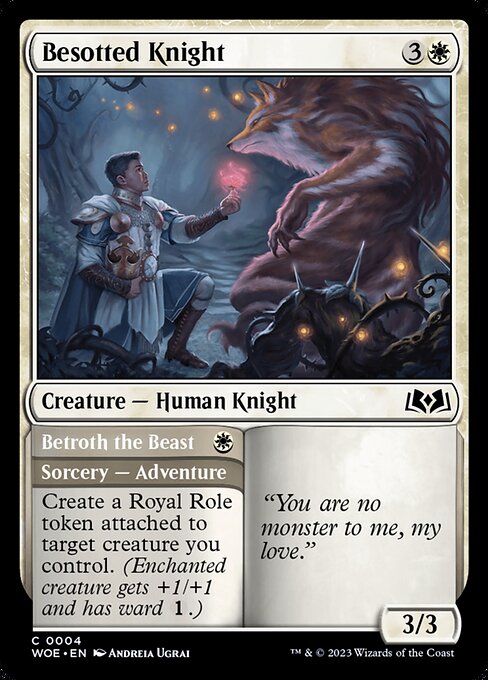

 0
0
 0.08€
0.08€
